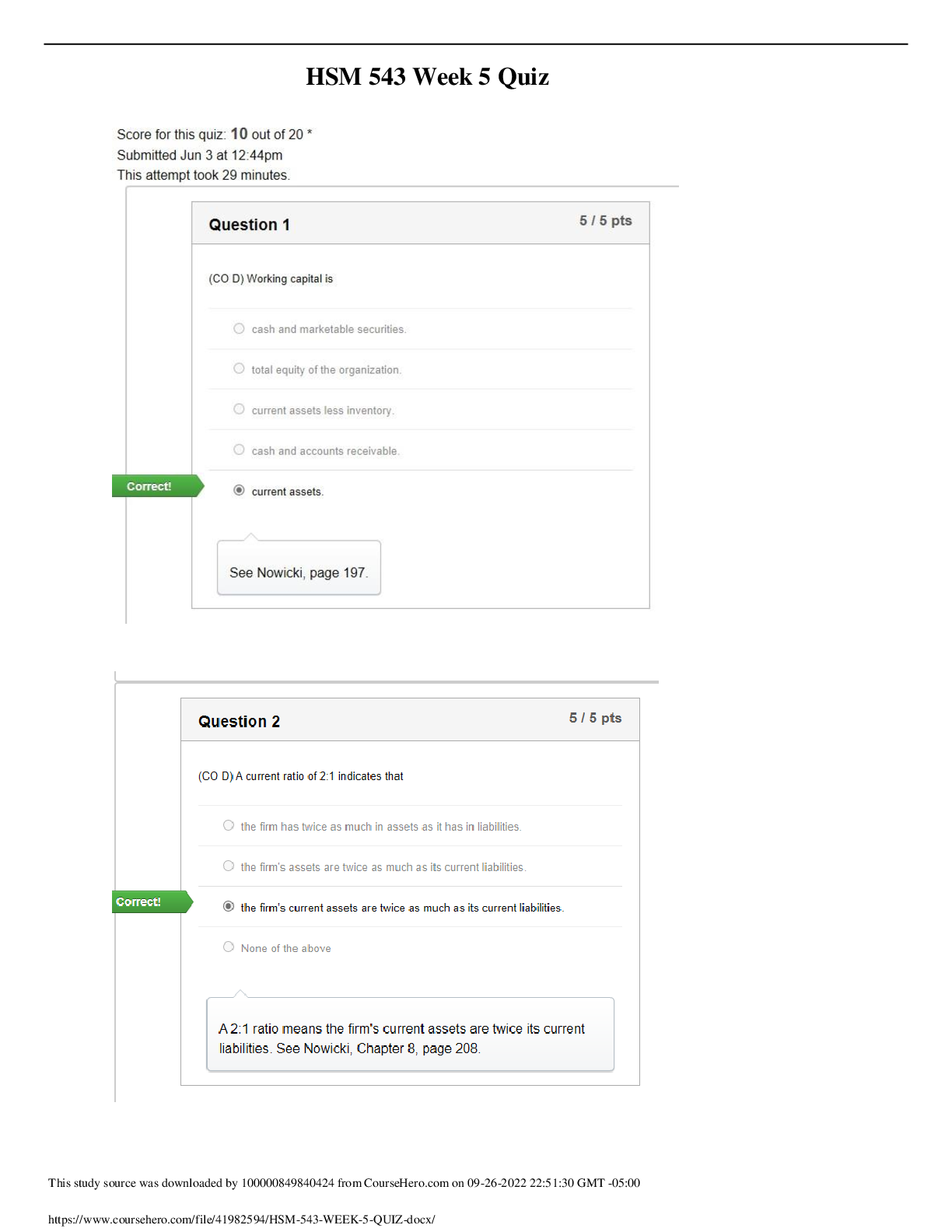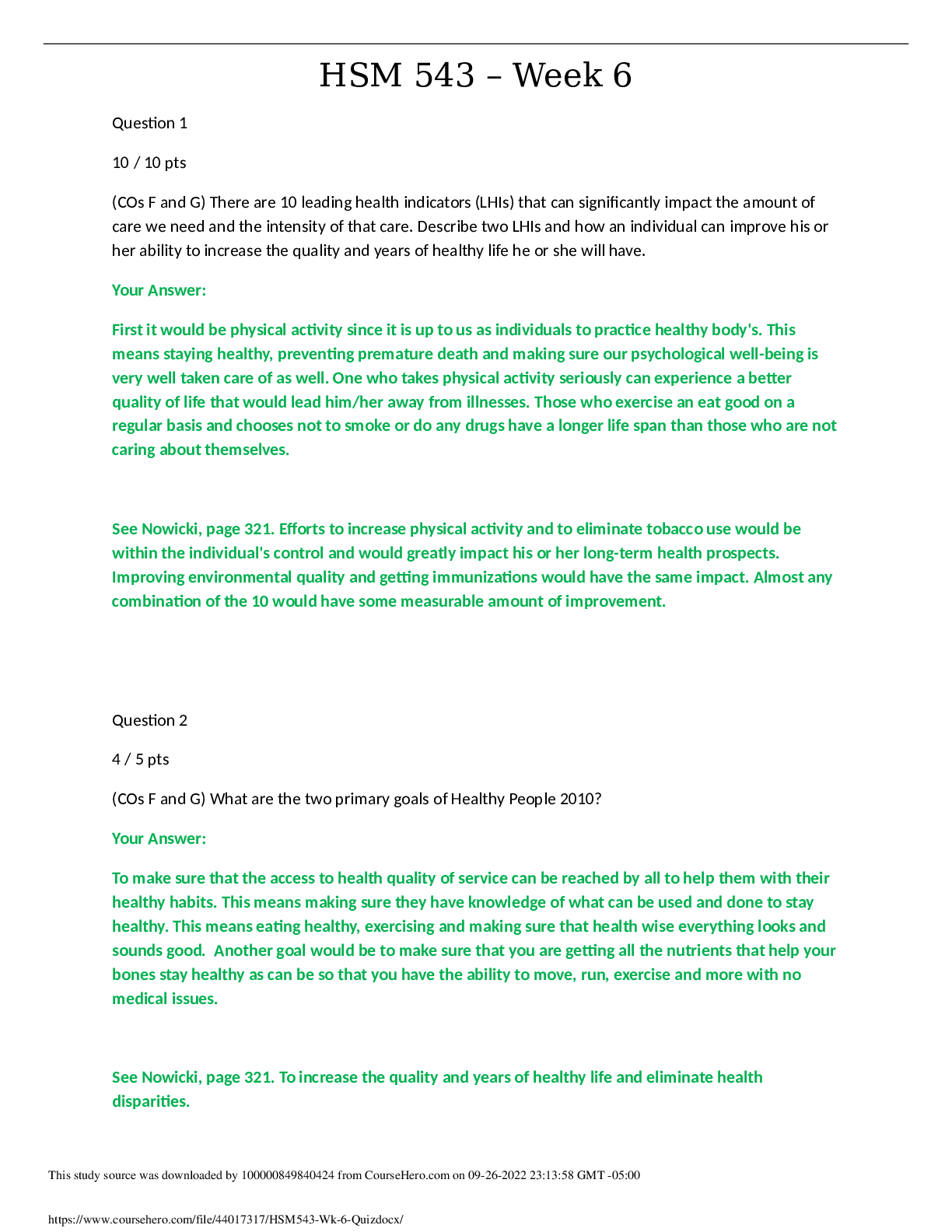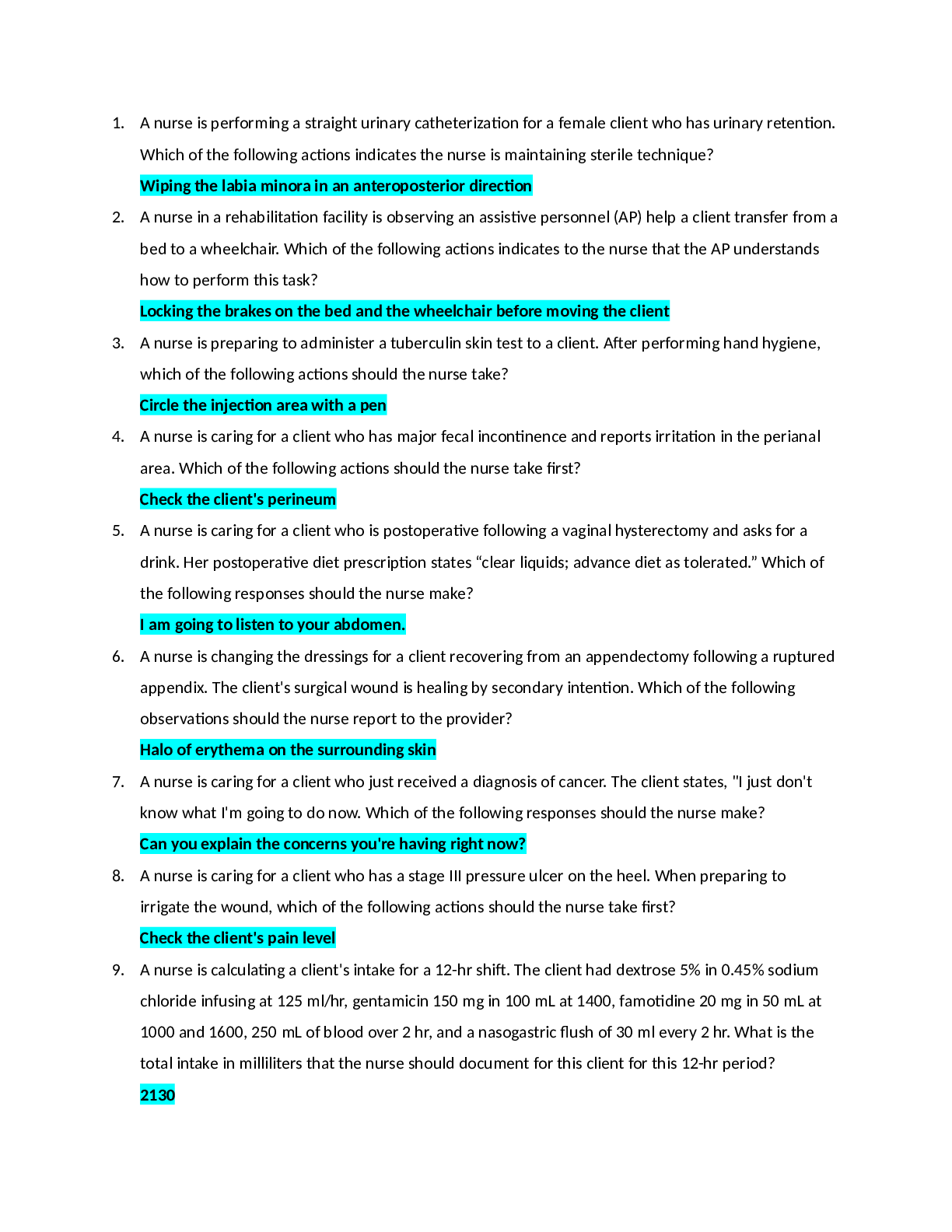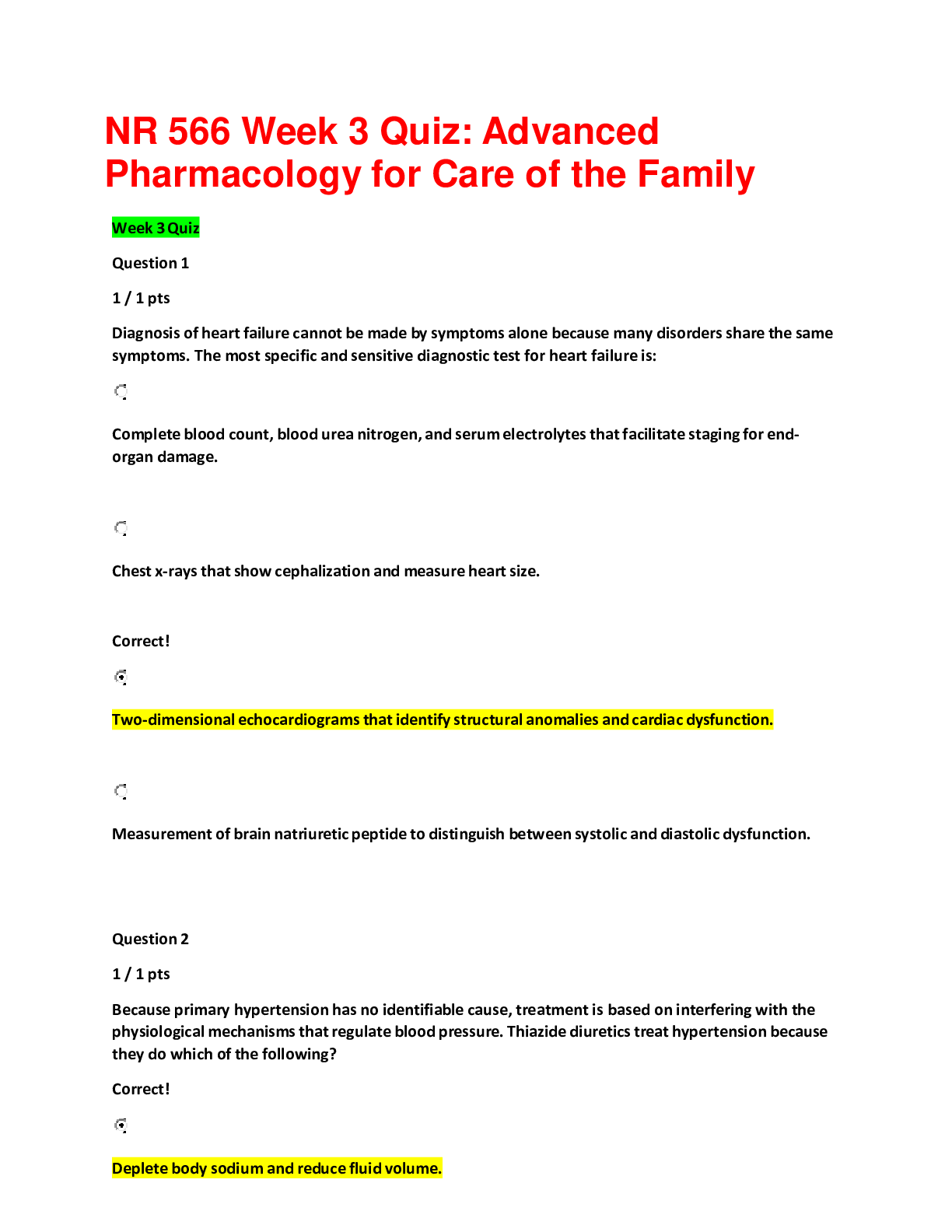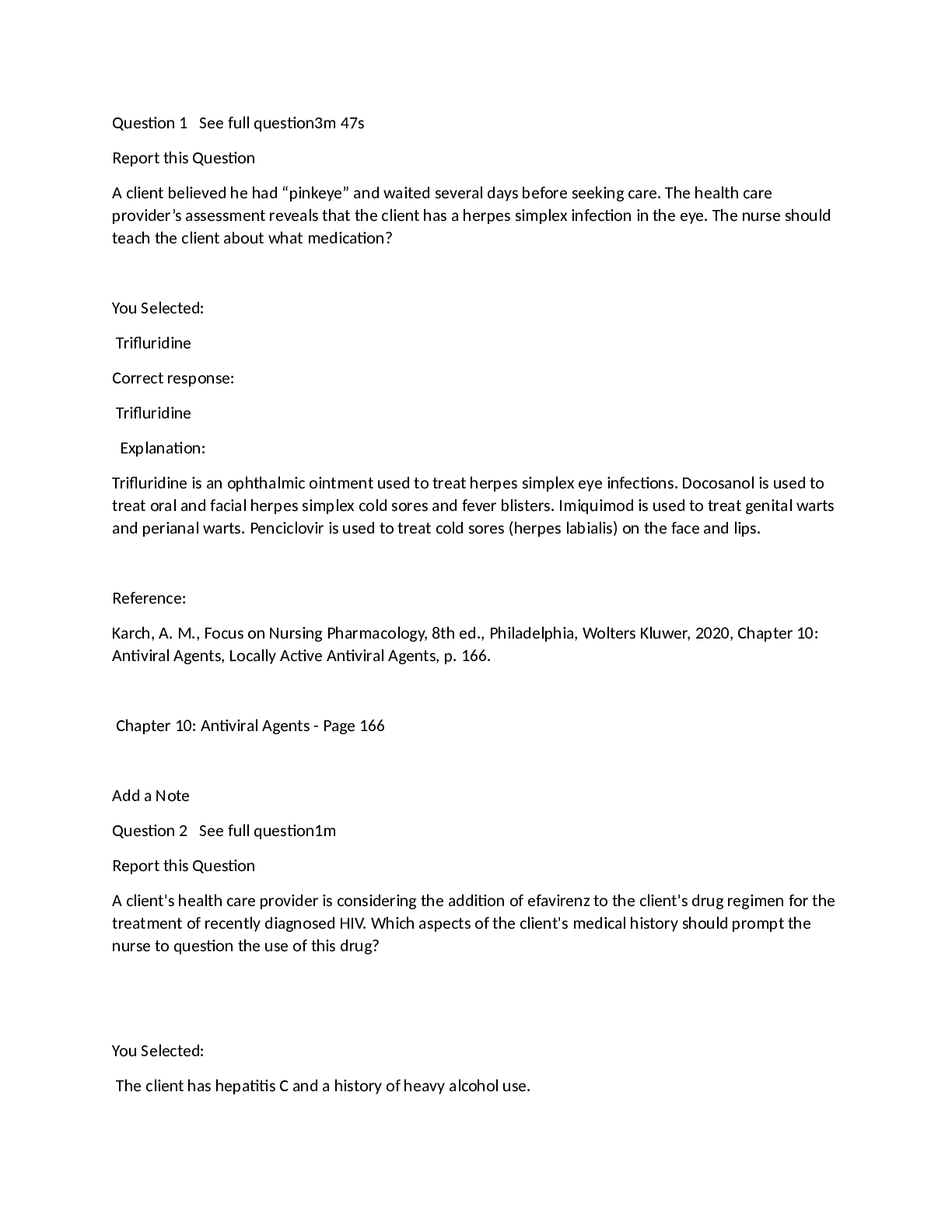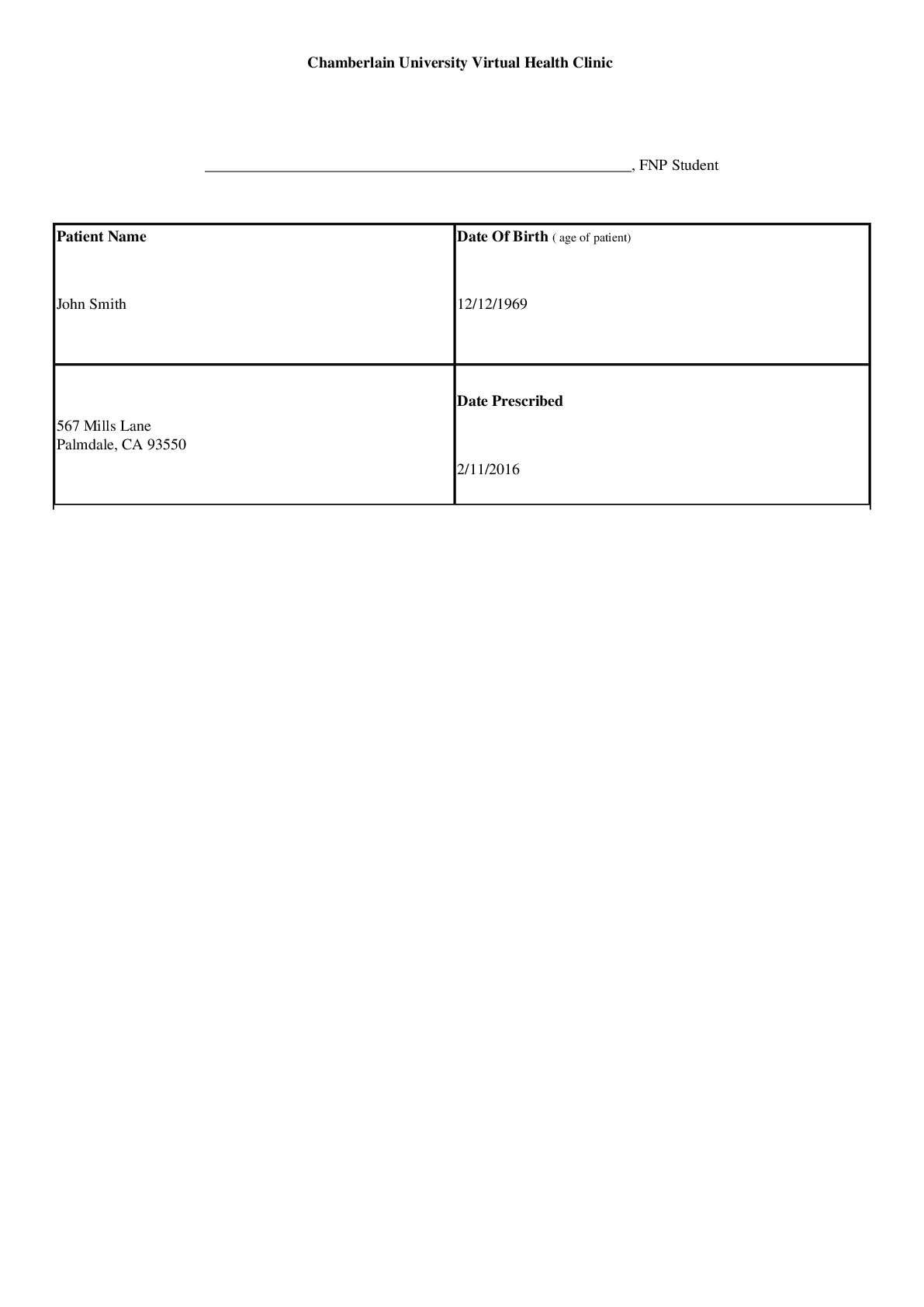*NURSING > EXAM > SOC WLF M108 Chapter 32- Mental Health Disorders (GRADED A) EXAM/ Latest Update/ Download To Score A (All)
SOC WLF M108 Chapter 32- Mental Health Disorders (GRADED A) EXAM/ Latest Update/ Download To Score An A.
Document Content and Description Below
Origin: Chapter 32- Mental Health Disorders, 1 Chapter: 32 Client Needs: D3 Cognitive Level: Application Difficulty: Moderate Integrated Process: Nursing process Objective: 1 Page and Header: 427,... Aging and Mental Health 1. Which of the following statements most accurately conveys an aspect of mental health among older adults? A) As a result of their life experiences, older adults have a lower incidence of depression. B) Older adults are less likely than younger people to use alcohol inappropriately as a coping tool. C) The overall incidence of mental illness is higher in young people than in older adults. D) The elderly are more likely than young adults to choose suicide. Ans: D Feedback: Suicide is more common among older adults than younger adults, as is depression and mental illness overall. Rates of alcoholism are not noted to be lower among the aged. Origin: Chapter 32- Mental Health Disorders, 2 Chapter: 32 Client Needs: C Cognitive Level: Application Difficulty: Easy Integrated Process: Nursing process Objective: 1 Page and Header: 426, Introduction 2. Which of the following are strengths that older people have which are advantages that many younger adults do not? (Select all that apply.) A) They probably have had more experience with coping, problem solving, and managing crises because they have lived longer. B) Most older persons do not have concerns about what they are going to be when they “grow up” because they have already grown up. C) Most elderly people have not learned who they really are. D) They have faced and overcome numerous stresses. Ans: A, B, D Feedback: Older people have an advantage over other age groups in that they probably have had more experience with coping, problem solving, and managing crises by virtue of the years they have lived. Most older persons have few delusions regarding what they are or what they are going to be. They know where they have been, what they have accomplished, and who they really are. Older people have faced and overcome many stresses, including immigrating to a new country, watching loved ones die from epidemics, fighting in world wars, and surviving the Great Depression. Origin: Chapter 32- Mental Health Disorders, 3 Chapter: 32 Client Needs: C Cognitive Level: Analysis Difficulty: Moderate Integrated Process: Nursing process Objective: 1 Page and Header: 426, Introduction 3. What factors may be reasons that older people may have mental illness despite the advantages of experience? (Select all that apply.) A) Mental illness is to be expected in older adults as they become demented. B) More people survive to old age and may bring problems that they have had throughout their lifetime. C) Mental health is generally increased as a person ages. D) The many losses and challenges of late life may exceed the physical, emotional, and social resources of some persons and promote mental illness. Ans: B, D Feedback: More people survive to old age, and any problems that they have had throughout their lifetimes may still be a part of their lives. The many losses and challenges of late life may exceed resources and promote mental illness. Older people do not necessarily become demented and mental illness is not to be expected. Mental health is not consistently increased by age. Origin: Chapter 32- Mental Health Disorders, 4 Chapter: 32 Client Needs: C Cognitive Level: Application Difficulty: Easy Integrated Process: Nursing process Objective: 1 Page and Header: 427, Promoting Mental Health in Older Adults 4. Which of the following are problems that older adults may confront that challenge their emotional homeostasis? (Select all that apply.) A) Altered function or body image B) Increased vulnerability to crime and abuse C) Independence from others D) Sensory deficits E) Greater awareness of own mortality Ans: A, B, D, E Feedback: Problems that older adults may confront that challenge their emotional homeostasis include the following: illness, which can be coping, related self-care demands, pain, altered function or body image; increased vulnerability to crime illness, disability, abuse; sensory deficits including decrease in or loss of function of hearing, vision, taste, smell, and touch; greater awareness of own mortality from increased numbers of deaths among peers. Older adults may not experience independence from others; in fact, many (but not all) elders have increased dependence on others. Origin: Chapter 32- Mental Health Disorders, 5 Chapter: 32 Client Needs: B Cognitive Level: Application Difficulty: Moderate Integrated Process: Teaching/learning Objective: 2 Page and Header: 427, Promoting Mental Health in Older Adults 5.A nurse who works in a long-term care facility recognizes the challenge of fostering and maintaining the mental health of residents. Which of the following suggestions for new residents is most appropriate? A) “It's helpful to maximize the amount of time that you spend with your family and peers.” B) “Try to stay involved in activities that you find satisfying and interesting.” C) “Don't hesitate to ask your physician about antidepressants whenever you feel your mood worsening.” D) “To maintain health and balance it's best to avoid spending too much time alone.” Ans: B Feedback: Mental health is fostered by maintaining involvement in personally satisfying activities. It would be inappropriate to recommend either maximizing social time or minimizing time alone for each and every resident, irrespective of personal preferences. It would be inaccurate to recommend antidepressants with every negative change in mood. Origin: Chapter 32- Mental Health Disorders, 6 Chapter: 32 Client Needs: C Cognitive Level: Application Difficulty: Moderate Integrated Process: Nursing process Objective: 2 Page and Header: 427, Promoting Mental Health in Older Adults 6. Mr. J, age 81, has been admitted to hospital for the treatment of diverticulitis. It is noted in his history that Mr. J has a history of depression. Which of the following nursing actions is most likely to foster his mental health? A) Performing as many of Mr. J's ADLs as possible to minimize his perceived burden of responsibility. B) Organizing a life review to remind Mr. J of the positives that exist in his life. C) Encouraging Mr. J to make decisions regarding his routine and care. D) Selecting a roommate for Mr. J who is social and optimistic. Ans: C Feedback: It is important to act only for individuals when necessary and to foster a sense of control. Forcing interaction with gregarious individuals or minimizing tasks and responsibilities is unlikely to benefit the patient. Origin: Chapter 32- Mental Health Disorders, 7 Chapter: 32 Client Needs: C Cognitive Level: Analysis Difficulty: Difficult Integrated Process: Nursing process Objective: 2 Page and Header: 427, Promoting Mental Health in Older Adults 7. Which one of the following is an appropriate principle that the nurse may use in guiding the care of mental health problems in elders? A) Strengthening the individual's capacity to manage the condition by promoting health. B) Eliminating the limitations imposed by the condition by doing everything possible for the individual. C) Challenging elderly persons by immersing them in new and unfamiliar situations that will stimulate their mental functioning. D) Insisting that elder persons do not spend time by themselves. Ans: A Feedback: Appropriate principles that the nurse may use in guiding the care of mental health problems in elders include strengthening the individual's capacity to manage the condition, by fostering improvement of physical health; eliminating or minimizing the limitations imposed by the condition; and acting or doing for the individual only when absolutely necessary. It would not be correct for the nurse to do everything possible for the individual, or immersing them in new and unfamiliar situations. It would also be inappropriate for the nurse to insist that elder persons do not spend time by themselves as some elders may prefer some time alone. Origin: Chapter 32- Mental Health Disorders, 8 Chapter: 32 Client Needs: C Cognitive Level: Analysis Difficulty: Moderate Integrated Process: Nursing process Objective: 3 Page and Header: 430, Signs and Symptoms 8. Which one of the following residents of a long-term care facility is most likely exhibiting signs and symptoms of depression? A) Mrs. L, age 79, who has withdrawn from her regular bridge games and no longer returns calls to her friends. B) Mr. U, age 76, whose neighbors have stated that he has become progressively more forgetful in the last several weeks. C) Ms. K, age 73, who has visited her primary care physician with complaints of palpitations and labored breathing accompanied by feelings of doom. D) Mrs. D, age 82, who is frequently tearful following the death of her husband 4 days prior. Ans: A Feedback: Social isolation and withdrawal is often a sign of depression, while decreased cognition is not as commonly indicative of the problem. Ms K. is more likely experiencing anxiety and Mrs. D is likely reacting normally, rather than pathologically, to a significant loss. Origin: Chapter 32- Mental Health Disorders, 9 Chapter: 32 Client Needs: C Cognitive Level: Analysis Difficulty: Difficult Integrated Process: Nursing process Objective: 3 Page and Header: 430, Signs and Symptoms 9. Which of the following would be symptoms of depression in an elderly person? (Select all that apply.) A) Inability to discriminate current reality from the past B) Inattention to hygiene C) Changes in sleep patterns D) Physical complaints such as anorexia, constipation, headache, and indigestion Ans: B, C, D Feedback: Symptoms of depression in elderly persons may include inattention to hygiene, changes in sleep patterns, and physical complaints such as anorexia, constipation, headache, and indigestion. The inability to discriminate current reality from the past may be a symptom of dementia. Origin: Chapter 32- Mental Health Disorders, 10 Chapter: 32 Client Needs: A2 Cognitive Level: Application Difficulty: Moderate Integrated Process: Nursing process Objective: 4 Page and Header: 432, Suicide Risk 10. Mrs. L has experienced a progressive loss of mobility over the last several years as a consequence of multiple sclerosis. Combined with a narrowing social circle, Mrs. L has characterized her life as “not worth living” and expressed to her nurse a desire to “end it all.” How should the nurse best respond to Mrs. L's statement? A) Assure Mrs. L that such challenges are not uncommon in older adults. B) Implement measures to ensure Mrs. L's safety. C) Inform Mrs. L's family about her statements. D) Add “risk for depression” to Mrs. L's nursing care plan. Ans: B Feedback: All threats of suicide should be taken seriously and safety measures established. Assurances are likely inappropriate and counterproductive, and modifying her care plan would be a less important action. Informing her family would be ethically questionable. Origin: Chapter 32- Mental Health Disorders, 11 Chapter: 32 Client Needs: A2 Cognitive Level: Application Difficulty: Moderate Integrated Process: Nursing process Objective: 4 Page and Header: 432, Suicide Risk 11. Mr. O is a patient on an acute medical unit of a hospital who is receiving treatment for a chronic pressure ulcer on his coccyx that has necessitated a temporary colostomy. The accompanying disturbance in his body image and activities of daily living has caused Mr. O to become depressed. During a visit by his daughter and son-in-law, the nurse brings Mr. O his scheduled medications, to which Mr. O states, “why not bring them all at once so I can end this mess.” The daughter dismisses her father's statement as simply an expression of his pessimistic demeanor. Which of the following statements most accurately underlies the response that the nurse will choose? A) Older people attempt suicide frequently but rarely succeed. B) While older adults do sometimes commit suicide, the problem is mostly an issue of younger adults. C) The patient's statement requires appropriate follow-up and should be taken seriously. D) Suicidal ideation in older adults is often a consequence of polypharmacy. Ans: C Feedback: Statements about suicide should be taken seriously and appropriate action taken. Suicide is a common event among older adults and while it may be a result of a drug interaction this is not necessarily the case. Origin: Chapter 32- Mental Health Disorders, 12 Chapter: 32 Client Needs: A2 Cognitive Level: Application Difficulty: Moderate Integrated Process: Teaching/learning Objective: 4 Page and Header: 432, Suicide Risk 12. Mr. G is called “Gloomy Gus” by his family, as he always sees the dark side of things. He has even threatened several times to kill himself, although he has not followed through on the threats. Lately, he seems preoccupied and has accidentally taken an overdose of a medication. He has just threatened suicide again. What should the nurse be sure that the family understand is important? A) Encourage him to find a psychoanalyst. B) Make sure he gets immediate attention by a psychiatrist. C) Ignore his “crying wolf” again. D) Remind him of his many blessings. Ans: B Feedback: Mr. G's call for help should not be ignored. Gus needs immediate attention, as it is possible he will actually try to kill himself. A psychoanalyst or other professional may be able to help him after his immediate safety is ensured. A person with depression is not helped by anyone asking him to cheer up. Origin: Chapter 32- Mental Health Disorders, 13 Chapter: 32 Client Needs: C Cognitive Level: Application Difficulty: Moderate Integrated Process: Nursing process Objective: 5 Page and Header: 434, Anxiety 13. An 80-year-old male patient who is receiving treatment for COPD in the geriatric medicine unit of a hospital has been displaying frequent signs of anxiety since admission. Which of the following nursing actions should the nurse prioritize? A) Implementing a predictable routine and providing explanations prior to nursing interventions. B) Ensuring that the patient has appropriate benzodiazepines prescribed. C) Explaining to the patient that his prognosis is good and that discharge will take place shortly. D) Working with the occupational therapist to provide the patient with meaningful activity. Ans: A Feedback: Predictability and routine are more useful than activity in the treatment of anxiety. Medications may or may not be appropriate, and an explanation of the patient's prognosis is less likely to be a useful intervention. Origin: Chapter 32- Mental Health Disorders, 14 Chapter: 32 Client Needs: C Cognitive Level: Application Difficulty: Moderate Integrated Process: Nursing process Objective: 5 Page and Header: 434, Anxiety 14. Some elderly patients may exhibit a pattern of behaviors that include insomnia, chain smoking, increased blood pressure, and frequency of voiding. What is one way a nurse can help them? A) Prepare them for all expected activities. B) Encourage them to enroll in stimulating classes. C) Have barriers installed to prevent their wandering. D) Encourage them to drink wine with dinner. Ans: A Feedback: Anxious patients need to have simplified, stable lives while they are suffering from anxiety. The basic causes also should be investigated so that the patients' anxiety may be relieved. Some classes might be too stimulating; unless the patients have dementia, they do not need to be fenced in; and even though wine may be part of a relaxed lifestyle, using it to alleviate anxiety might lead to dependence. Origin: Chapter 32- Mental Health Disorders, 15 Chapter: 32 Client Needs: C Cognitive Level: Analysis Difficulty: Moderate Integrated Process: Nursing process Objective: 5 Page and Header: 434, Anxiety 15. Which of the following statements about the nursing care of older persons with anxiety is most accurate? A) Older adults should be encouraged to have daily coffee chats with their peers. B) The nurse should encourage the older persons to avoid thinking about or discussing the source of their anxiety. C) Medication is the most appropriate treatment for anxiety in older adults. D) Nurses should plan interventions specific to the underlying cause. Ans: D Feedback: Nurses should plan interventions specific to the underlying cause. Caffeine may increase anxiety. The nurse should allow adequate time for conversations. It may be helpful for the elderly clients to discuss the source of their anxiety, and it is likely not possible for the anxious persons to avoid thinking about the source of their anxiety. Medication may not be appropriate to treat anxiety in many cases and may cause additional problems. Origin: Chapter 32- Mental Health Disorders, 16 Chapter: 32 Client Needs: C Cognitive Level: Analysis Difficulty: Moderate Integrated Process: Nursing process Objective: 6 Page and Header: 434, Alcohol Abuse 16. Which one of the following statements about alcohol abuse/dependency or addiction in older populations is most accurate? A) It is easy to determine if an older adult suffers from alcohol abuse. B) Older adults who abuse alcohol have always used it very heavily throughout their lives. C) The incidence of alcohol and illegal drug abuse in elderly persons is declining. D) Alcohol abuse can seriously threaten the physical, emotional, and social health of older persons. Ans: D Feedback: Alcohol abuse can seriously threaten the physical, emotional, and social health of older persons. Many persons who are addicted to alcohol do not reach old age or they may have used it throughout their lives or began using it as they have grown older. Alcohol abuse/dependency or addiction is often difficult to identify in older persons because it may be unexpected and sometimes mimics symptoms of common geriatric conditions. The incidence of alcohol abuse and illicit drug use in older adults is increasing because the number of people reaching late life is increasing. Origin: Chapter 32- Mental Health Disorders, 17 Chapter: 32 Client Needs: D3 Cognitive Level: Application Difficulty: Easy Integrated Process: Nursing process Objective: 6 Page and Header: 435, Box 32-5 17. Which of the following are possible indications of alcohol abuse? (Select all that apply.) A) Drinking one alcoholic beverage daily over a prolonged period of time B) Frequent injuries or falls due to clumsiness C) Keeping to oneself and being irritable around others D) Experiencing blackouts E) Using alcohol to calm nerves or improve mood Ans: B, C, D, E Feedback: Possible indications of alcohol abuse include gulping or rapidly consuming alcoholic beverages (not consuming one alcoholic beverage over a prolonged period of time), frequent injuries or falls due to clumsiness, keeping to oneself and being irritable around others, experiencing blackouts, and using alcohol to calm nerves or improve mood. Origin: Chapter 32- Mental Health Disorders, 18 Chapter: 32 Client Needs: C Cognitive Level: Application Difficulty: Moderate Integrated Process: Teaching/learning Objective: 7 Page and Header: 436, Hypochondriasis 18. The children of a 78-year-old frail woman are exasperated at what they perceive to be her obsession with her ailing health. The children state that their mother rarely talks about anything other than her health problems and is constantly scheduling appointments with her physician that they believe are frivolous. How should the woman's nurse direct the family to deal with their mother's problem? A) Focus on fostering their mother's health in the knowledge that the problem will diminish if her health improves. B) Bar their mother from making appointments that they deem unnecessary and reassure her that her health is stable. C) Resolve to accept their mother's priorities and engage with her prioritization of her health problems. D) Focus on engaging their mother in conversations that include a discussion of topics other than her health. Ans: D Feedback: Spending time in nonillness–related conversation can demonstrate that one can receive attention without resorting to physical complaints. The interventions in answers A, B, and C are not appropriate. Origin: Chapter 32- Mental Health Disorders, 19 Chapter: 32 Client Needs: C Cognitive Level: Application Difficulty: Moderate Integrated Process: Teaching/learning Objective: 7 Page and Header: 436, Hypochondriasis 19. Mr. Y visits his elderly mother weekly at an assisted living facility 70 miles from his home. Mr. Y has noted that in recent months his mother frequently fixates their conversations on the treatment and prognosis of her various health challenges. Mr. Y admits to his mother's nurse that as an only child he now feels an overwhelming guilt around the infrequency of his visits, a fact that his mother constantly emphasizes. How can the nurse best respond to Mr. Y's concerns? A) “It's not uncommon for some older people to emphasize their ailments in order to manipulate others' behavior in some way.” B) “If your mother's health has become such a priority to her, it may be time to consider placing her in long-term care rather than assisted living.” C) “Your best strategy is to ignore anything that your mother says about her failing health and her physical challenges.” D) “This is often a sign of an underlying cognitive deficit that remains undiagnosed; I'll be sure to mention this to your mother's physician.” Ans: A Feedback: Some older people find hypochondriasis an effective means of controlling a spouse or children. Changing her residence or ignoring her would not likely be appropriate responses to her behavior, and hypochondriasis is not noted to be commonly rooted in neurological condition. Origin: Chapter 32- Mental Health Disorders, 20 Chapter: 32 Client Needs: C Cognitive Level: Application Difficulty: Moderate Integrated Process: Nursing process Objective: 7 Page and Header: 436, Hypochondriasis 20.A group of women at a senior center spend a great deal of time talking together about their physical problems, comparing symptoms and remedies. They seem to have no interests outside their own health. What might a counselor do for them? A) Encourage them to join a book club or discussion group. B) Sit down with them and listen to their complaints. C) Tell them to talk about something else. D) Break up the group to ensure they talk to new people. Ans: A Feedback: These women may have real physical or mental problems, and a physician should evaluate any repeated complaints. Assuming they are hypochondriacs, a counselor should avoid reinforcing their negative behavior by listening to their complaints. Joining a book or discussion group will give them something else to talk about. Talking to new people at the senior center may simply continue the problem unless they also have new topics of conversation. Origin: Chapter 32- Mental Health Disorders, 21 Chapter: 32 Client Needs: C Cognitive Level: Application Difficulty: Moderate Integrated Process: Nursing process Objective: 7 Page and Header: 436, Hypochondriasis 21. Hypochondriasis may be commonly associated with which one of the following problems in older adults? A) Anxiety B) Depression C) Paranoia D) Dementia Ans: B Feedback: Hypochondriasis is commonly associated with depression. Origin: Chapter 32- Mental Health Disorders, 22 Chapter: 32 Client Needs: C Cognitive Level: Analysis Difficulty: Easy Integrated Process: Nursing process Objective: 7 Page and Header: 436, Hypochondriasis 22. Which of the following statements about hypochondriasis in older adults is most accurate? A) Symptoms are never an indication of an underlying physical problem. B) Symptoms are always an indication of an underlying physical problem. C) Hypochondriasis may be a means of controlling a spouse or children. D) Hypochondriasis is often caused by failure of health care providers to reinforce physical complaints. Ans: C Feedback: Hypochondriasis may be a means of controlling a spouse or children. Symptoms may be an indication of an underlying physical problem or they may not be. Hypochondriasis can be triggered by health care providers' not reinforcing periods of good function and health. Origin: Chapter 32- Mental Health Disorders, 23 Chapter: 32 Client Needs: D2 Cognitive Level: Application Difficulty: Moderate Integrated Process: Nursing process Objective: 8 Page and Header: 437, Monitoring Medications 23.A 76-year-old woman has been prescribed a selective serotonin reuptake inhibitor (SSRI) for the treatment of her depression. What assessments should the nurse prioritize during the initial days of the patient's drug therapy? A) Monitoring for changes in the patient's cognitive status and nutrition. B) Regular assessment of the patient's vital signs. C) Monitoring the patient's blood work for fluid and electrolyte imbalances. D) Assessment of the patient's integument for signs of skin breakdown of inadequate circulation. Ans: A Feedback: Psychiatric medications can influence the cognition and nutritional status of patients more frequently than their vital signs, fluid and electrolytes, and integument. Origin: Chapter 32- Mental Health Disorders, 24 Chapter: 32 Client Needs: A2 Cognitive Level: Application Difficulty: Moderate Integrated Process: Nursing process Objective: 8 Page and Header: 437, Monitoring Medications 24.Which of the following statements about monitoring the use of psychotropic medications in older adults is most accurate? A) Any side effects are likely to be mild. B) Medications are the best method of dealing with psychiatric problems in older adults. C) Side effects in older persons may be profound. D) The highest dosage of medications should be used in older adults. Ans: C Feedback: Psychotropic medications may have profound adverse effects in older adults. Side effects are not likely to be mild, but they are likely to be profound. Medications should be used to complement and not substitute for other forms of treatment in adults. The lowest possible dosage should be used. Origin: Chapter 32- Mental Health Disorders, 25 Chapter: 32 Client Needs: C Cognitive Level: Application Difficulty: Moderate Integrated Process: Nursing process Objective: 9 Page and Header: 437, Promoting a Positive Self-Concept 25.A recreational therapist has proposed an organized program to the nurse manager of a long-term care facility that the therapist claims can significantly improve the self- concept of residents. Which of the following components of the therapist's program is most likely to achieve the stated goal? A) Bringing in a staff member's dog to regularly interact with residents. B) Organizing a series of health promotion classes for residents that will be conducted by staff nurses. C) Holding reminiscence sessions where residents are encouraged to write autobiographical life reviews. D) Beginning a chair aerobics class to increase physical activity by frail residents. Ans: C Feedback: Activities such as having life-review discussions, recording oral histories, and compiling a scrapbook of life events not only help older adults feel a sense of worth about the lives they have lived but also provide a sense of history and legacy for younger generations. This is more likely to foster residents' self-concepts than exercise, education, or pet therapy. Origin: Chapter 32- Mental Health Disorders, 26 Chapter: 32 Client Needs: A1 Cognitive Level: Application Difficulty: Moderate Integrated Process: Nursing process Objective: 10 Page and Header: 437, Managing Behavioral Problems 26. To the embarrassment of his family, an 81-year-old male patient on the subacute unit of a hospital has made repeated, sexually inappropriate statements to female staff members. The patient's family is adamant that such behavior is uncharacteristic. What should be the nurse's initial action? A) Attempt to identify the underlying cause of the patient's behavior. B) Explore pharmacologic treatment options with the patient's physician. C) Emphasize to the patient that such behavior is not permissible. D) Liaise with the nurse manager to ensure the patient receives care from male staff whenever possible. Ans: A Feedback: While the actions in answers B, C, and D may be appropriate in the management of the patient's behavior, the priority is to identify exactly why the patient is behaving in this way. Origin: Chapter 32- Mental Health Disorders, 27 Chapter: 32 Client Needs: A2 Cognitive Level: Application Difficulty: Moderate Integrated Process: Nursing process Objective: 10 Page and Header: 439, Table 32-3 27. Which of the following is the most effective nursing action for an elderly person who becomes violent/physically abusive? A) Understanding that elderly persons have weakened physical conditions and are unlikely to cause harm to themselves or others. B) Scheduling time for supervised walking. C) Putting persons in situations that trigger the behavior to desensitize the person. D) Getting help to protect self and others. Ans: D Feedback: Appropriate nursing actions for a violent/physically abusive elderly person include getting help to protect self and others; and avoiding putting persons in situations that trigger behaviors. Elderly persons do not necessarily have weakened physical conditions and may harm themselves or others, especially if the person feels threatened. Scheduling time for supervised walking is an appropriate intervention for wandering. Origin: Chapter 32- Mental Health Disorders, 28 Chapter: 32 Client Needs: A2 Cognitive Level: Application Difficulty: Moderate Integrated Process: Nursing process Objective: 10 Page and Header: 439, Table 32-3 28. Which of the following would be appropriate nursing actions for an elderly person with night-wandering? (Select all that apply.) A) Ensure that the client is engaged in daytime activities, particularly late day exercise. B) Keep the light on at all times. C) Lock the door so that the elderly person cannot leave their room. D) Assist the elderly person to toilet before bedtime. E) Encourage the elderly person to sleep in the daytime. Ans: A, D Feedback: Providing daytime activities, especially late day exercise, and toileting before bed time can help with night-wandering. A night light should be kept on in bedroom and bathroom, but there is no need to have a light on at all times. Although the environment should be safeguarded, the wanderer should not be locked in the room. Daytime sleeping could promote nighttime awakeness. [Show More]
Last updated: 1 year ago
Preview 1 out of 16 pages
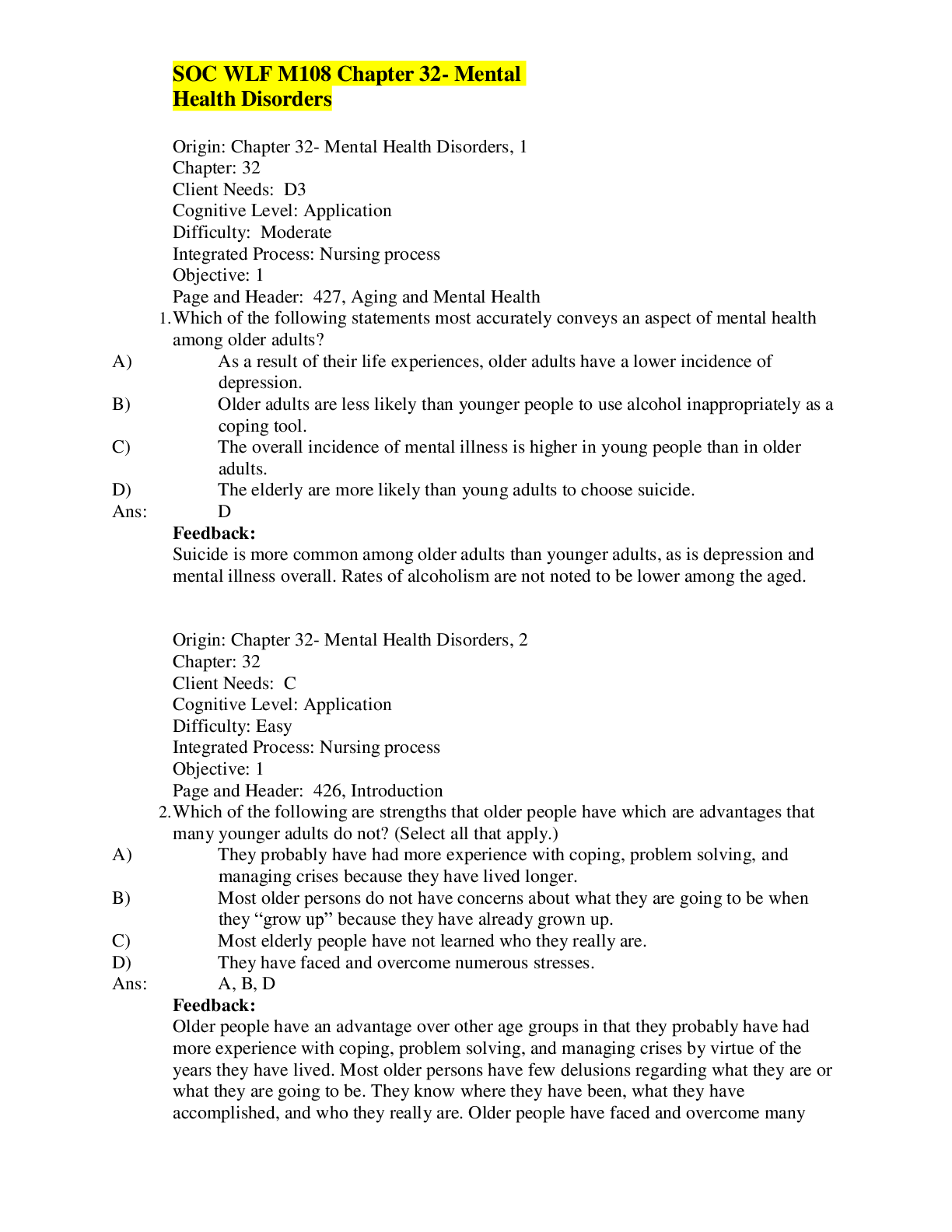
Reviews( 0 )
Document information
Connected school, study & course
About the document
Uploaded On
Nov 03, 2021
Number of pages
16
Written in
Additional information
This document has been written for:
Uploaded
Nov 03, 2021
Downloads
0
Views
33

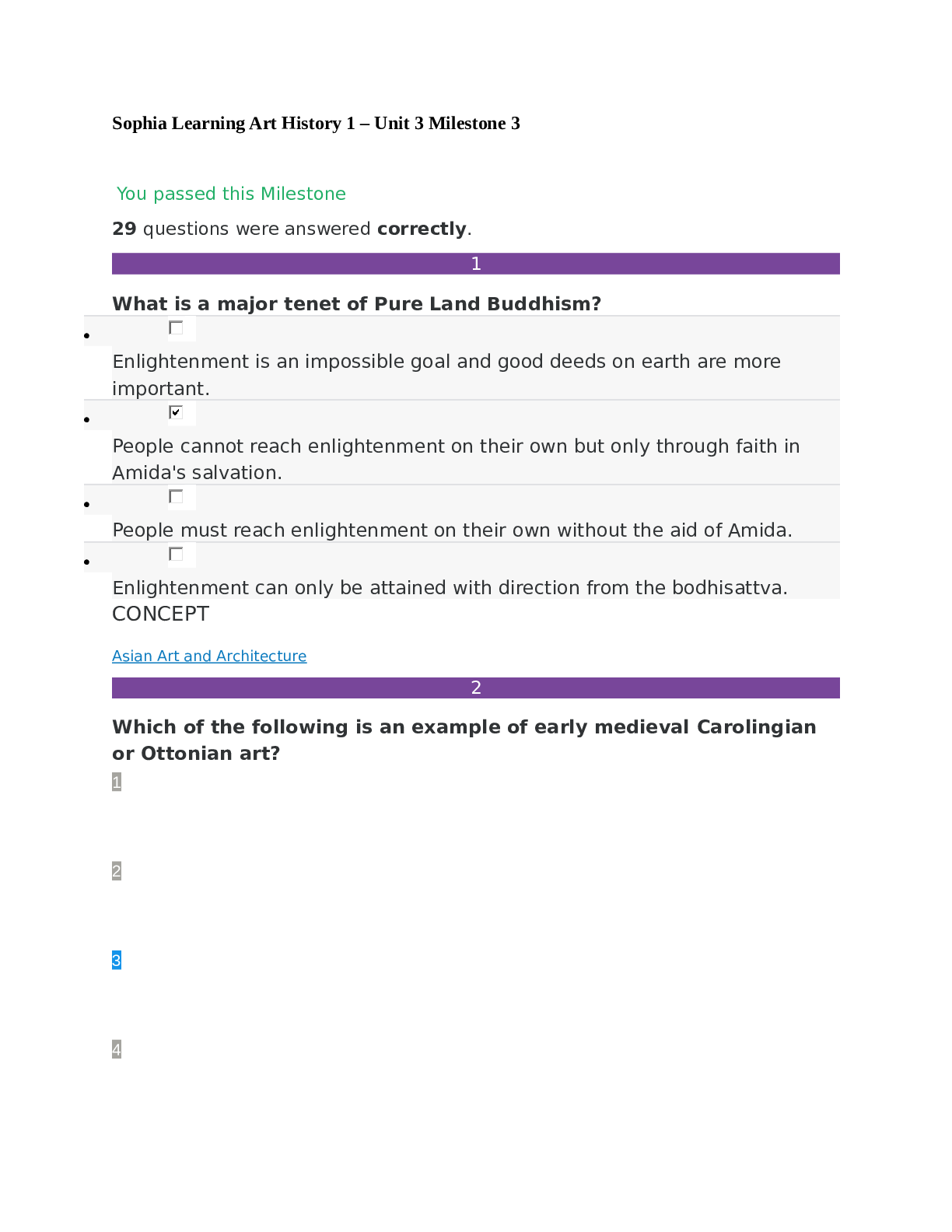
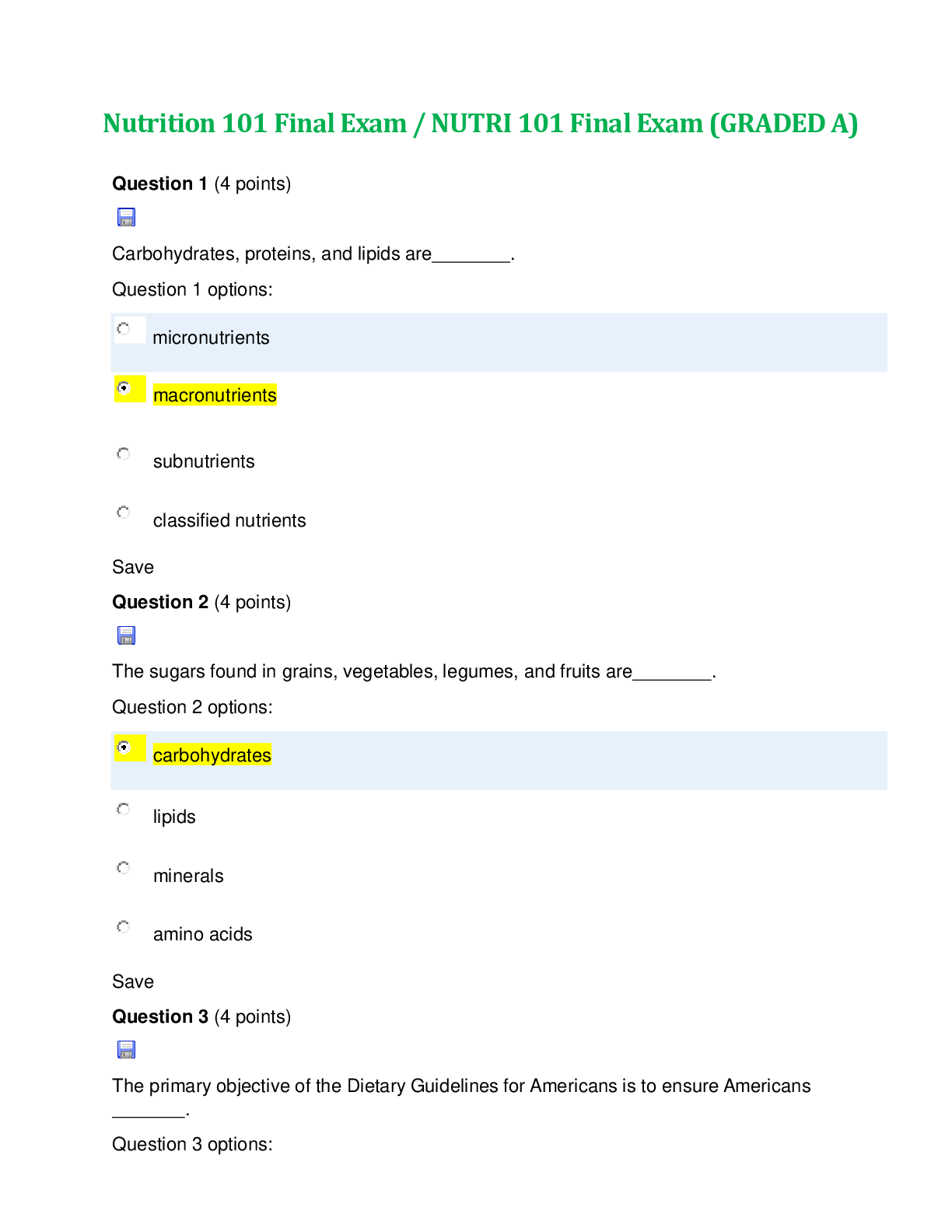
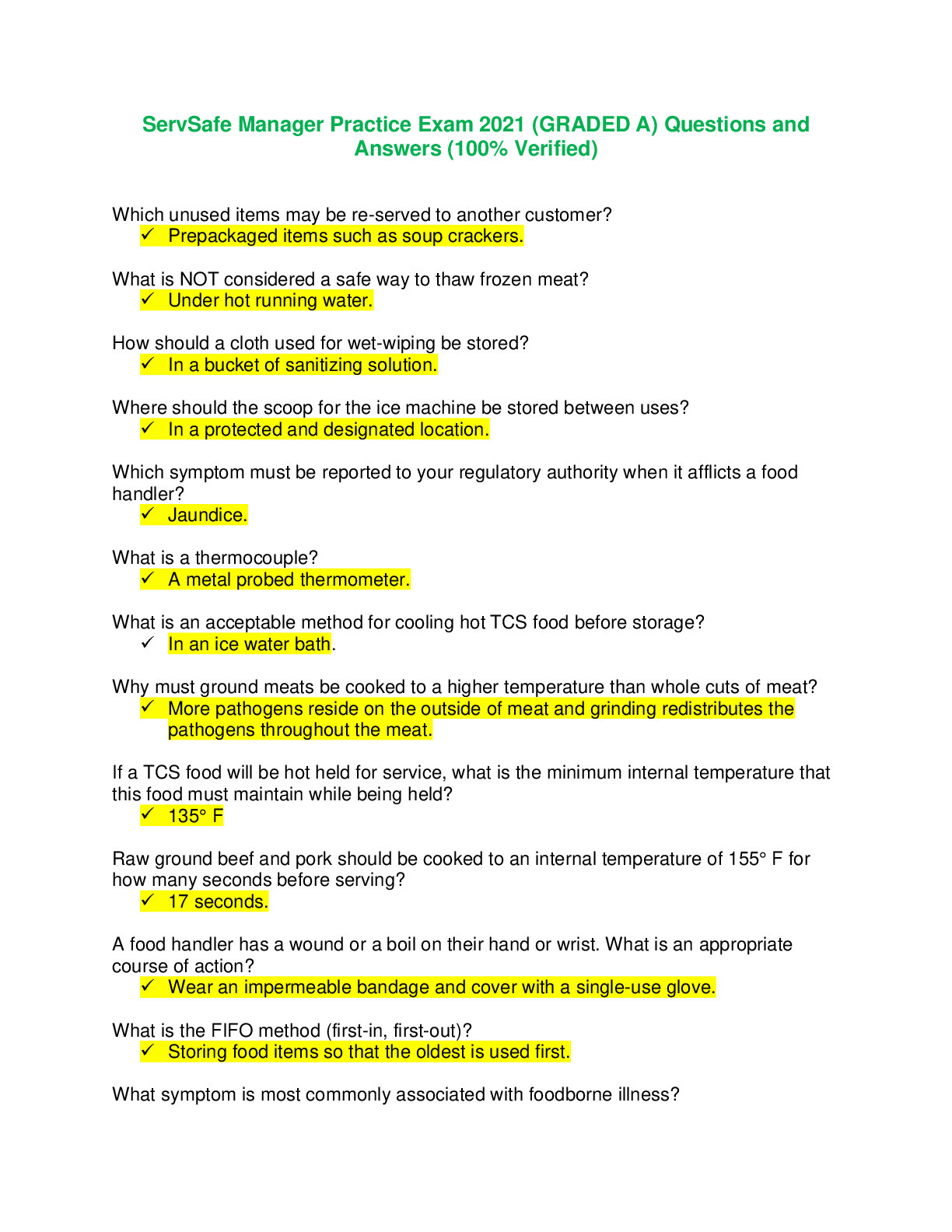
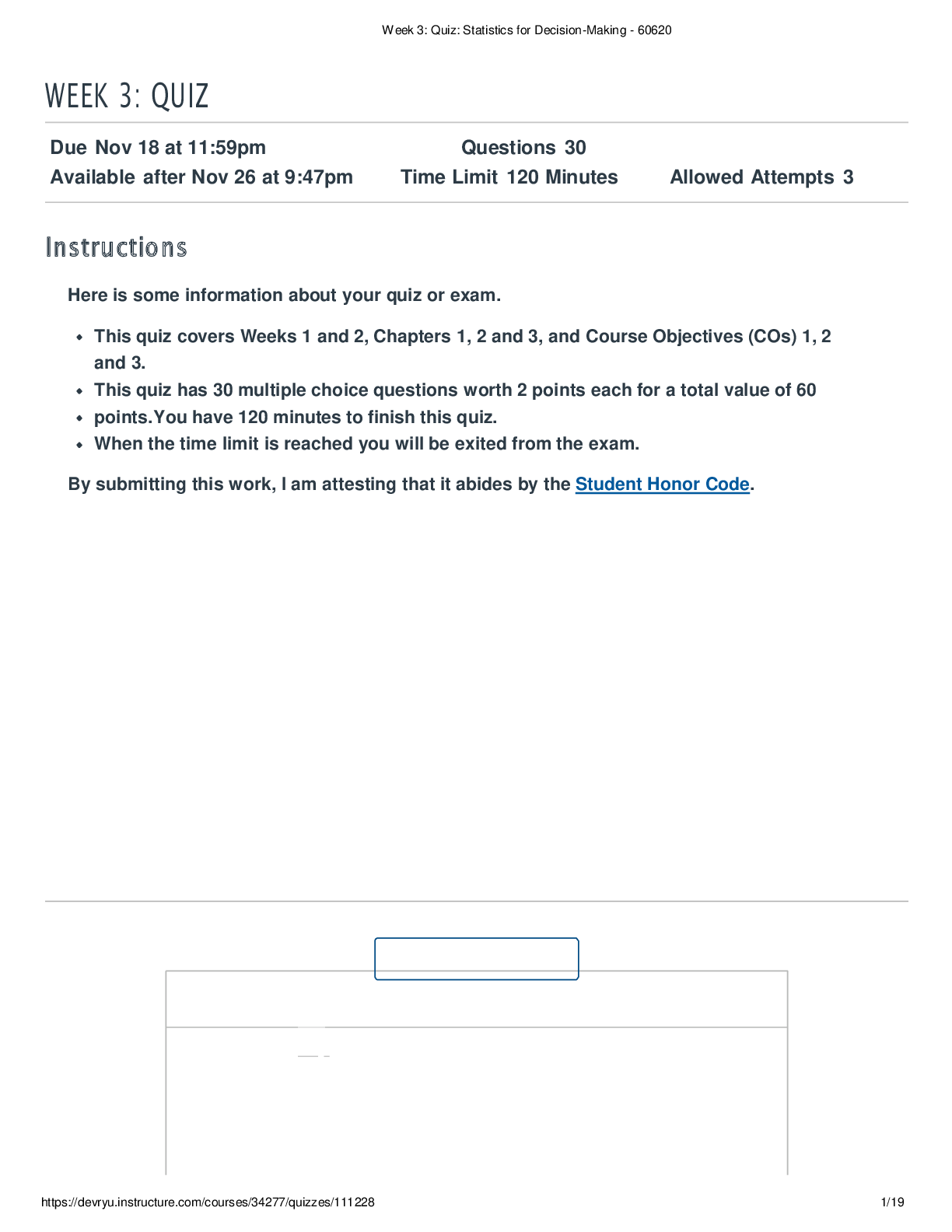
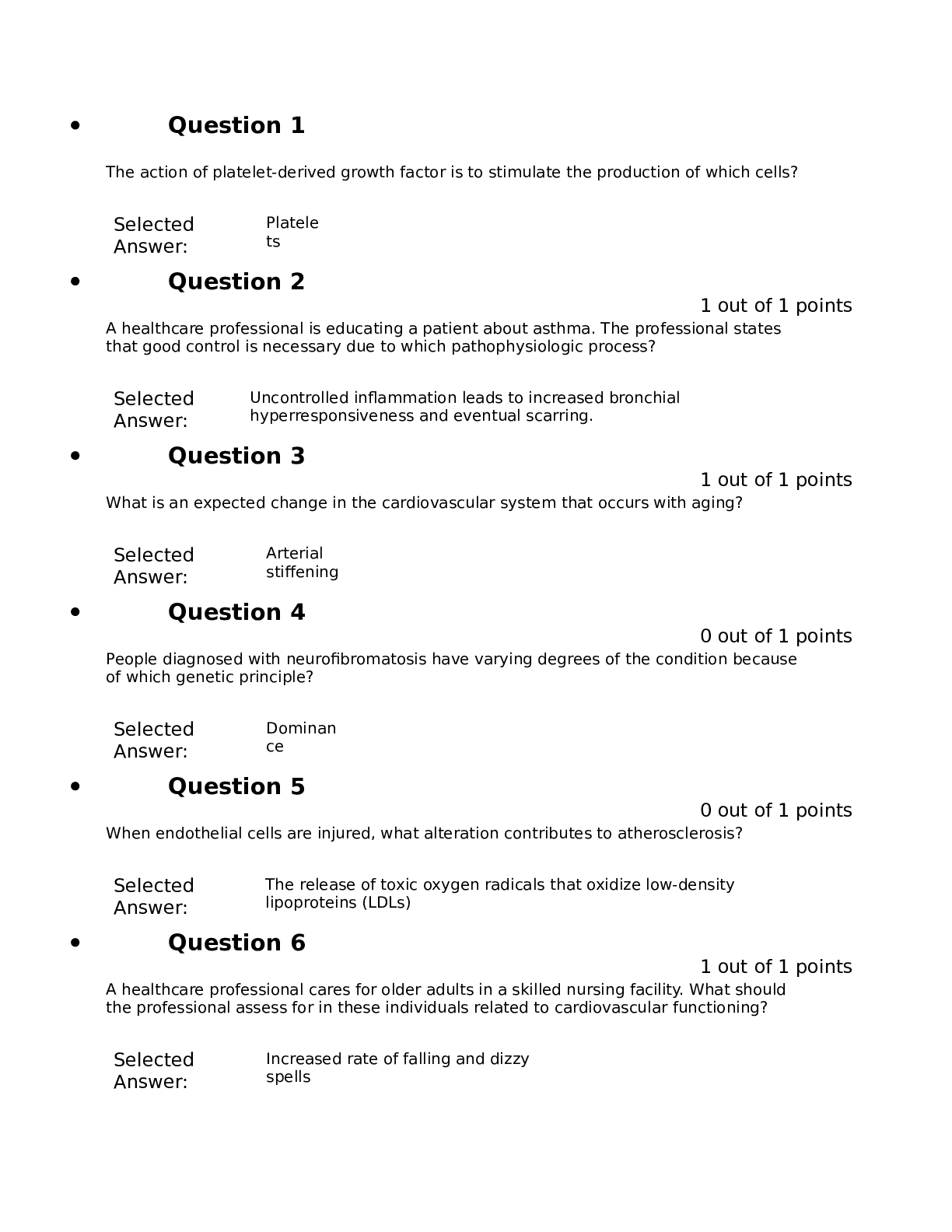
.png)
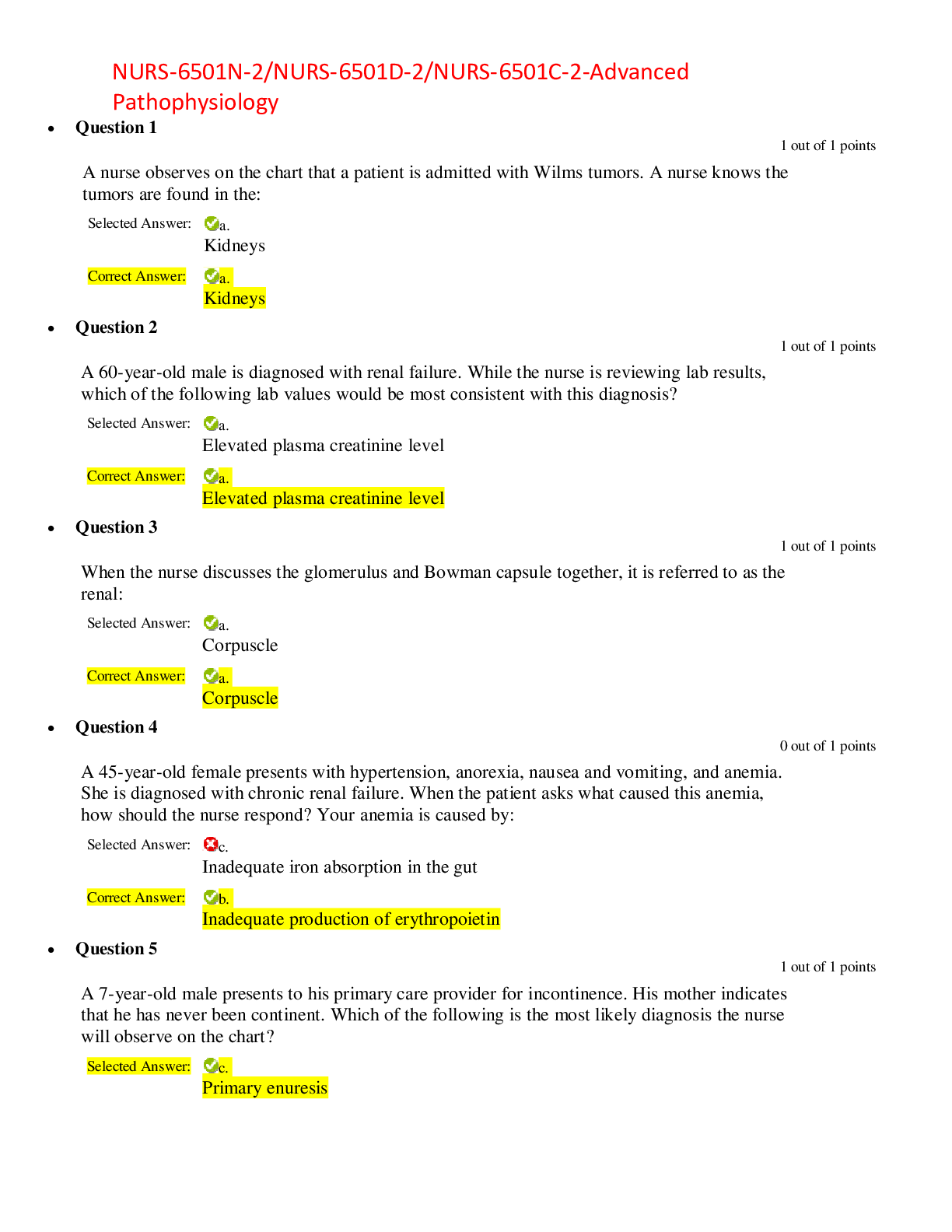
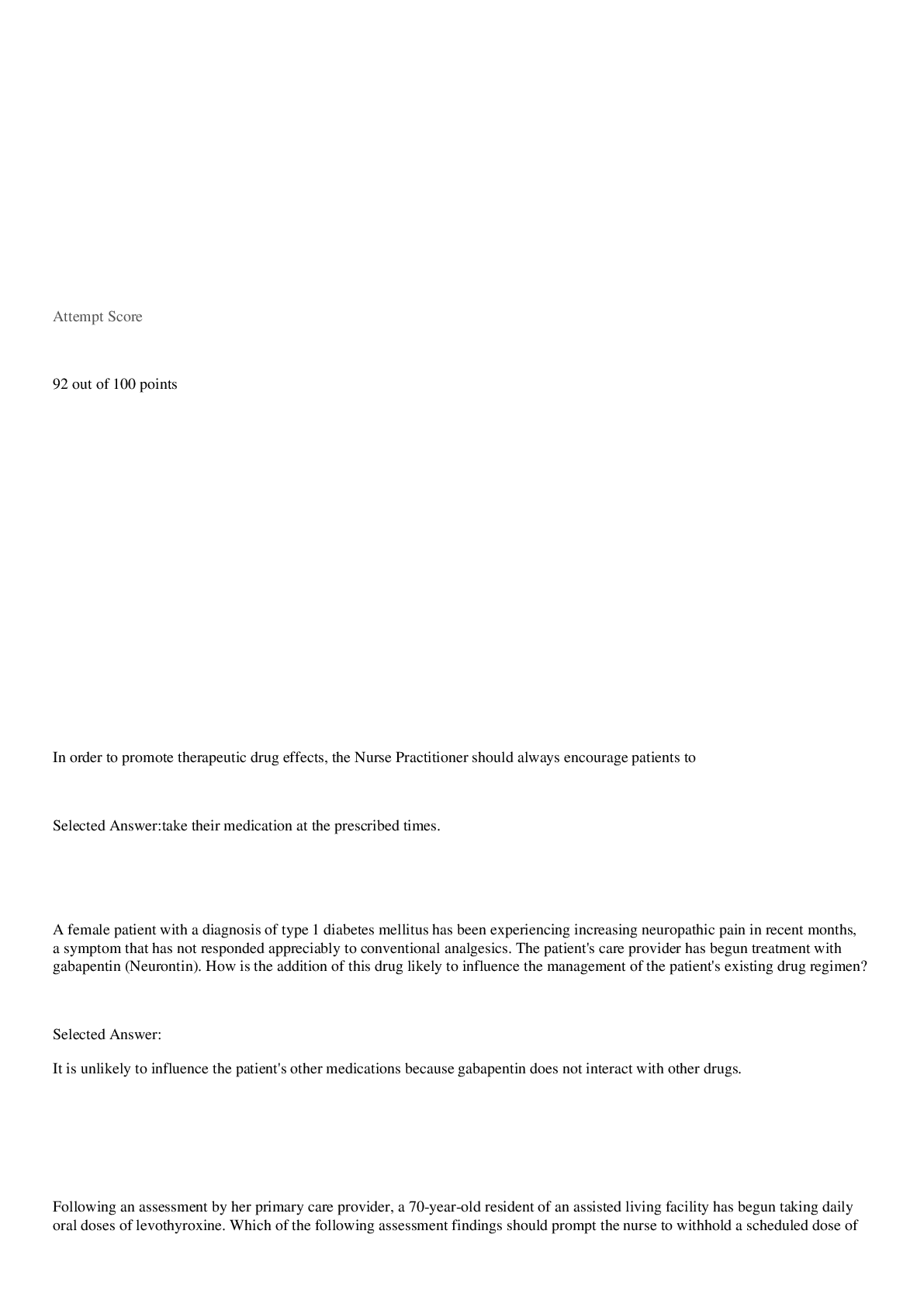
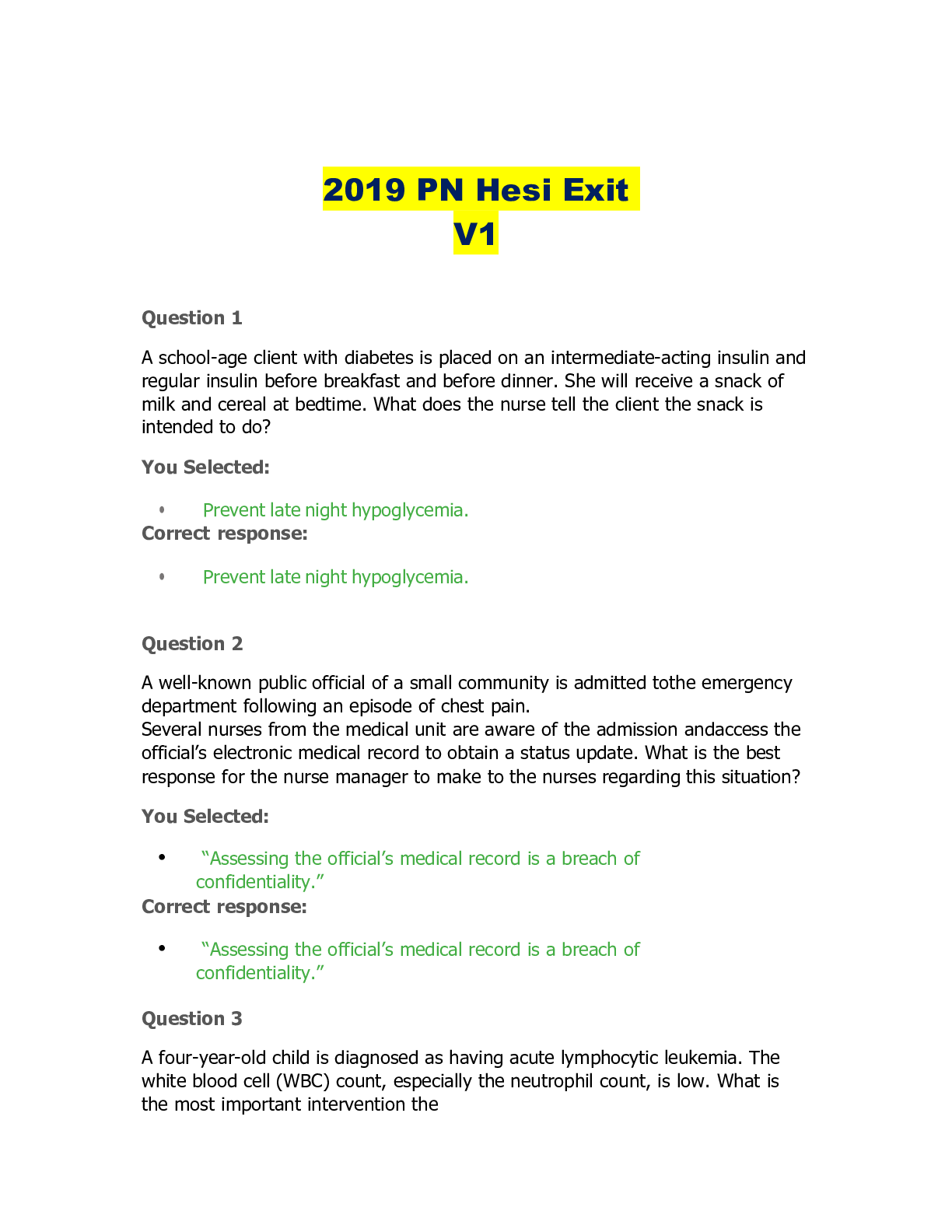
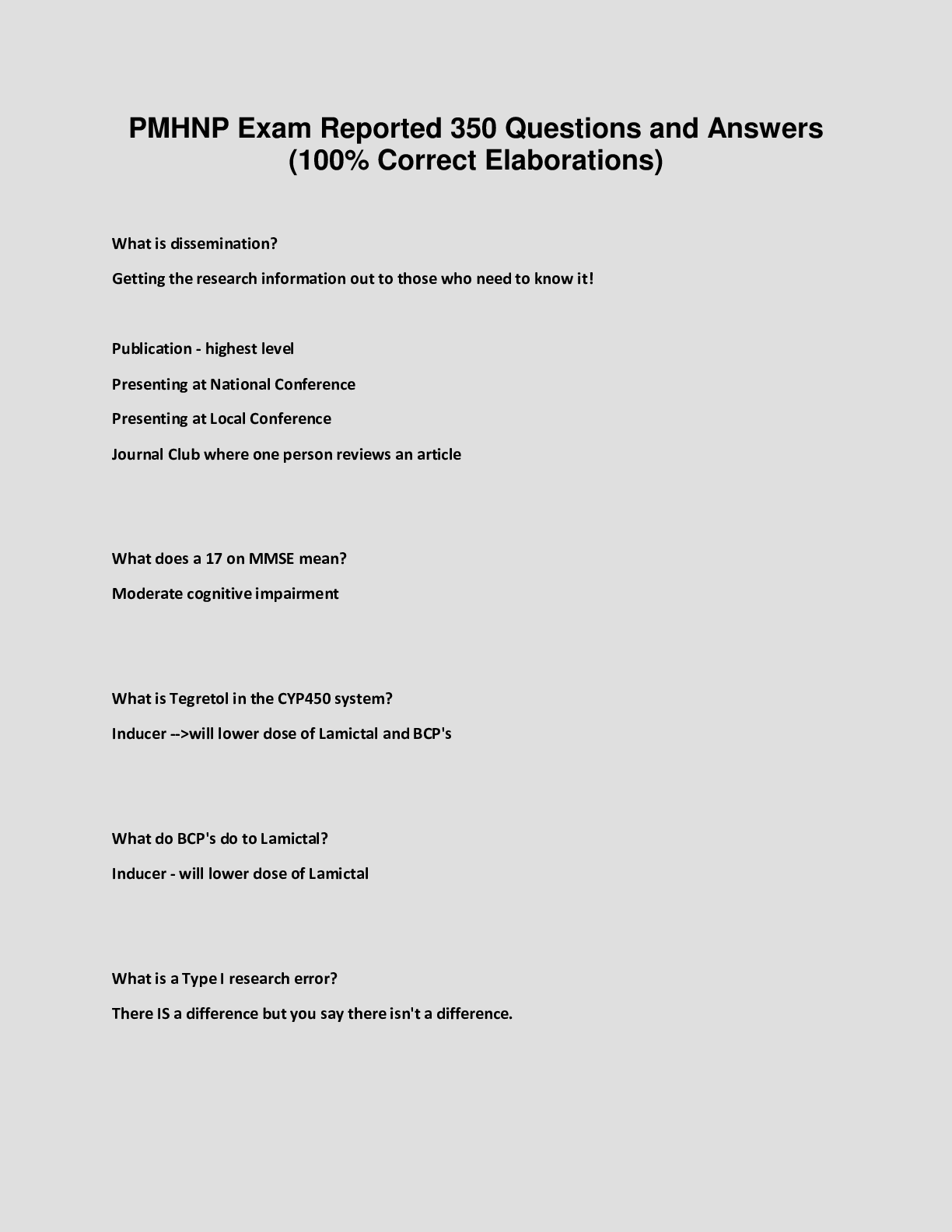
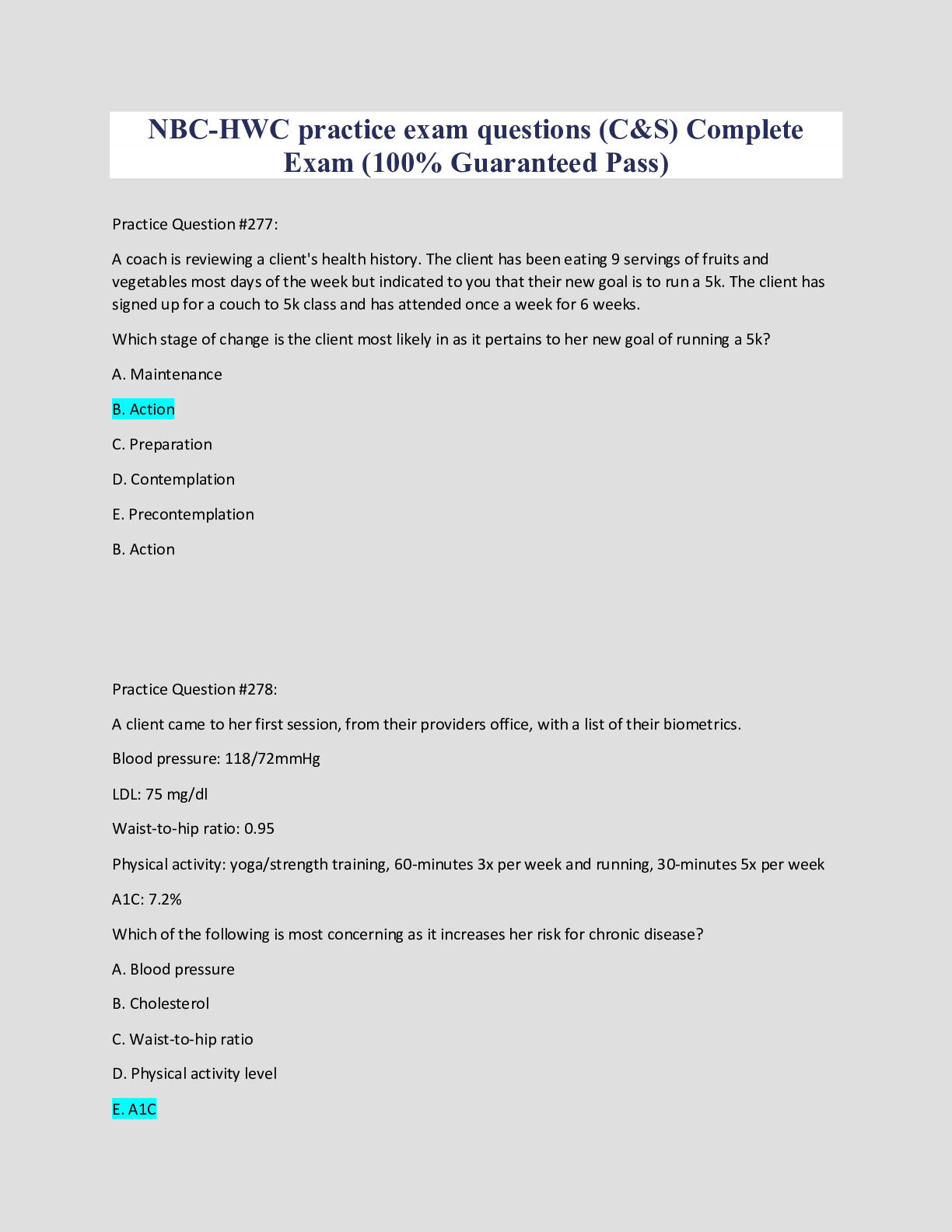
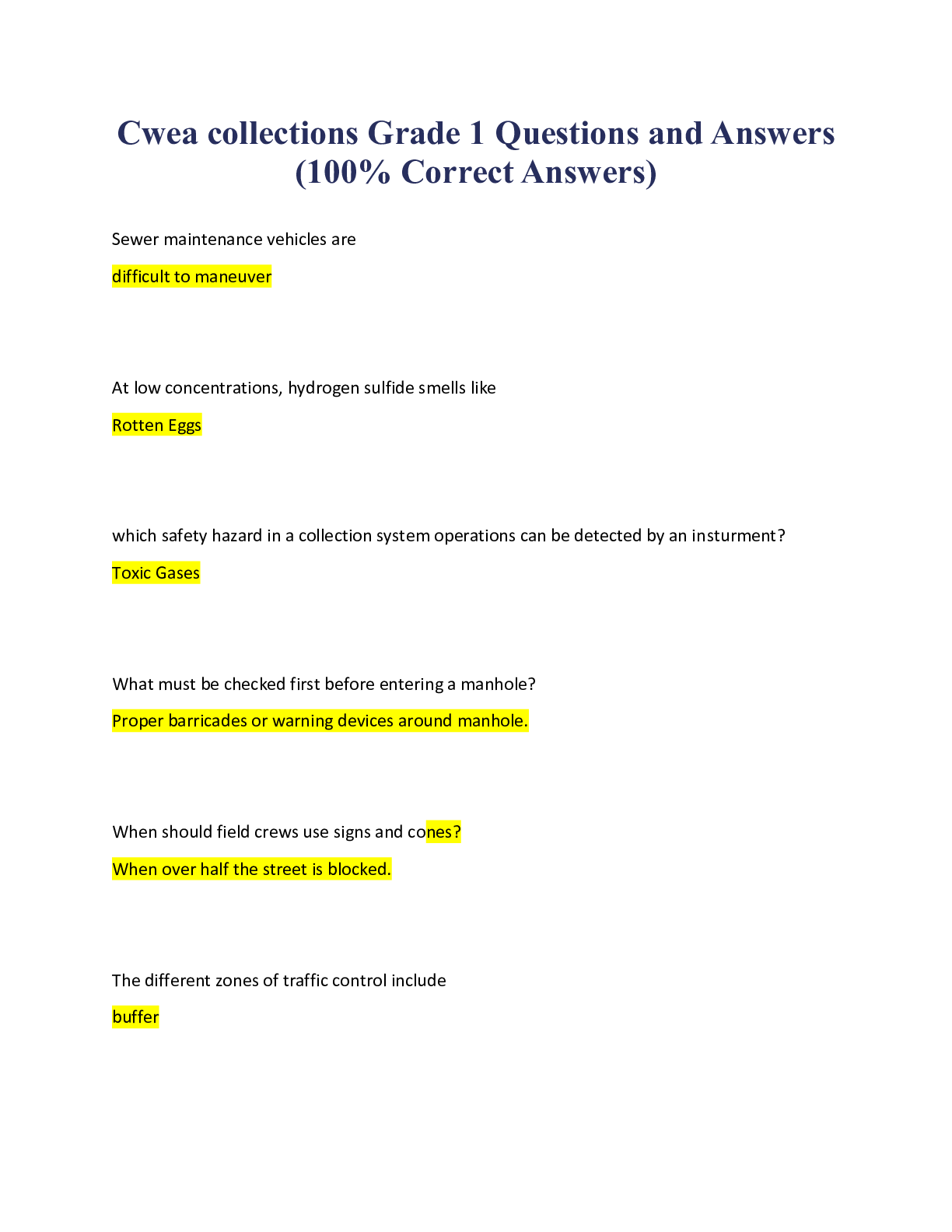
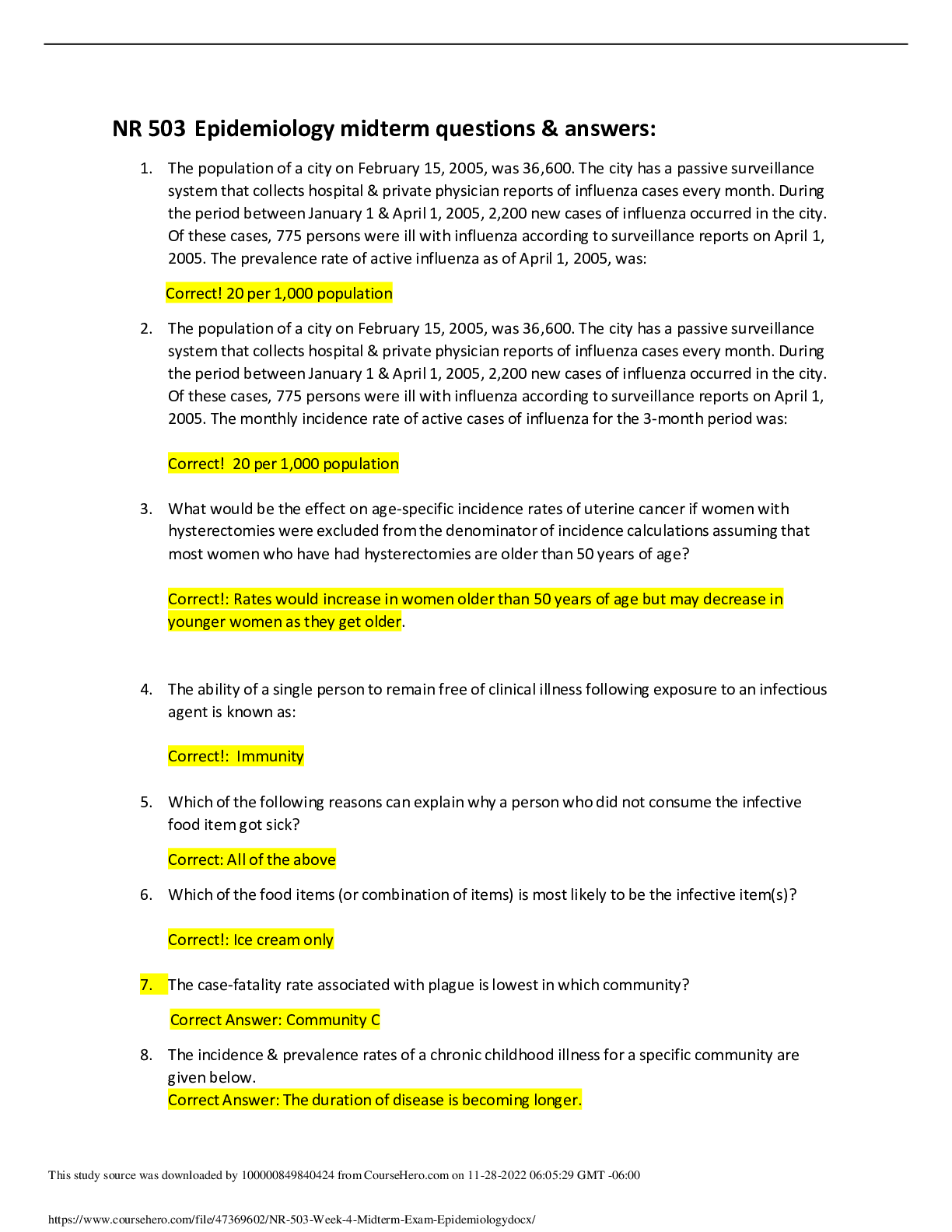
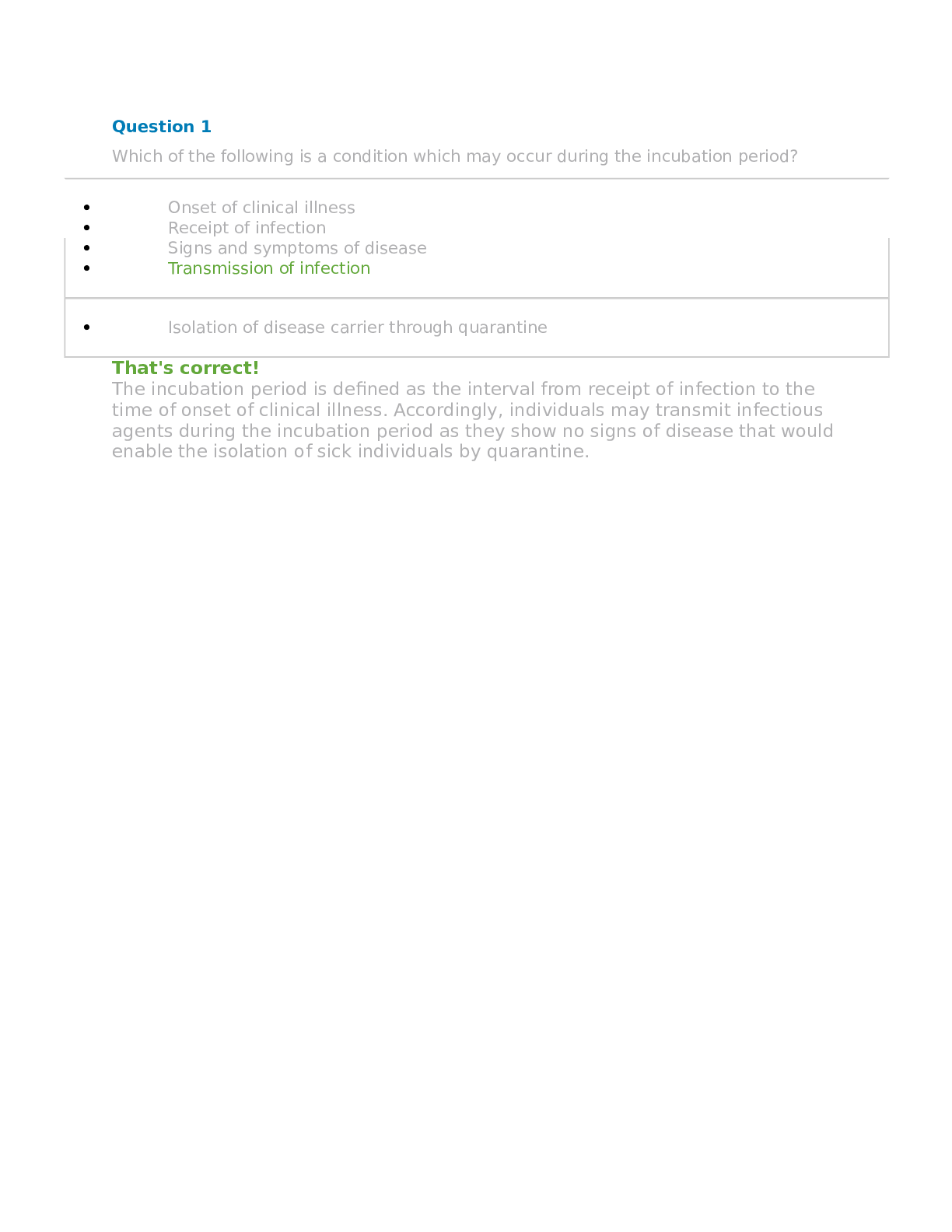
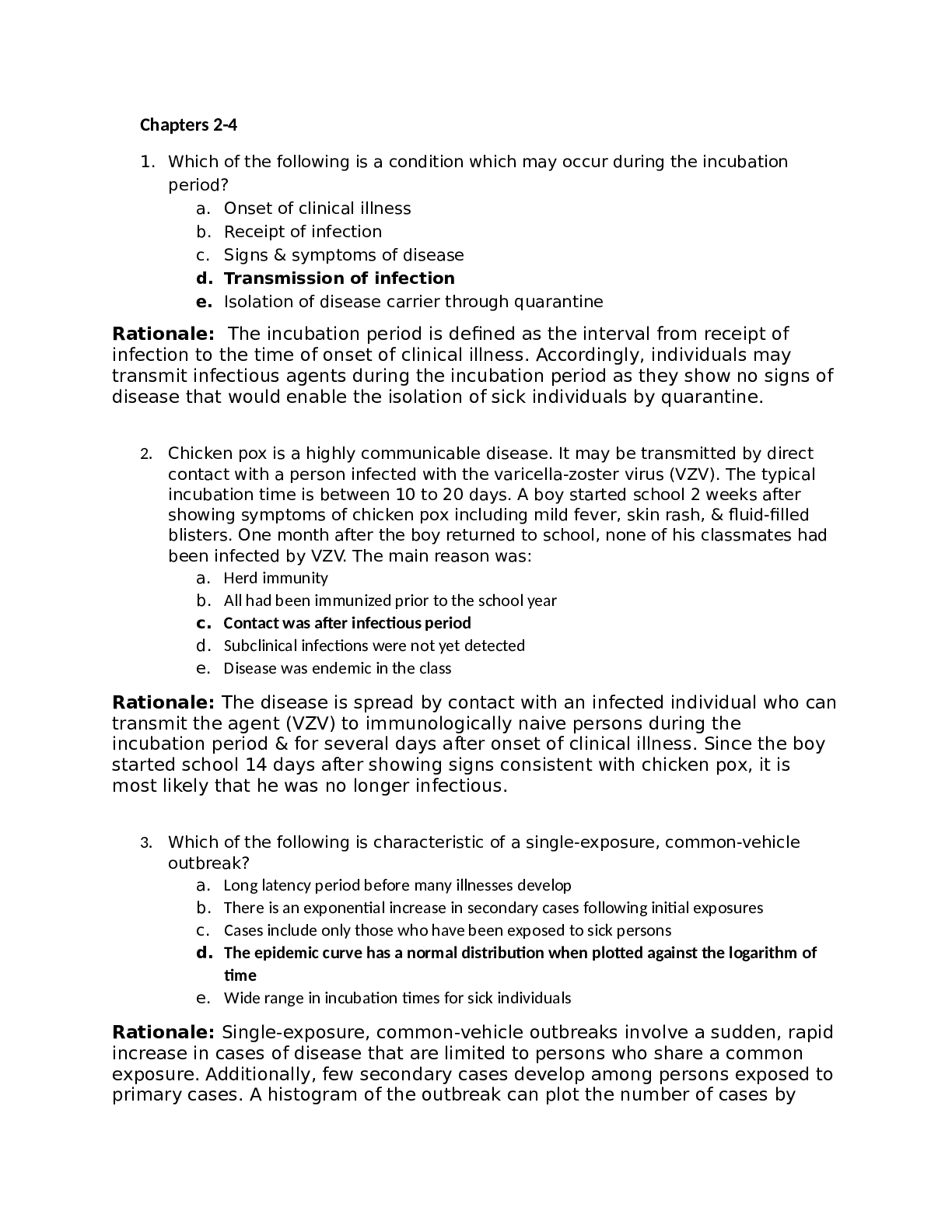


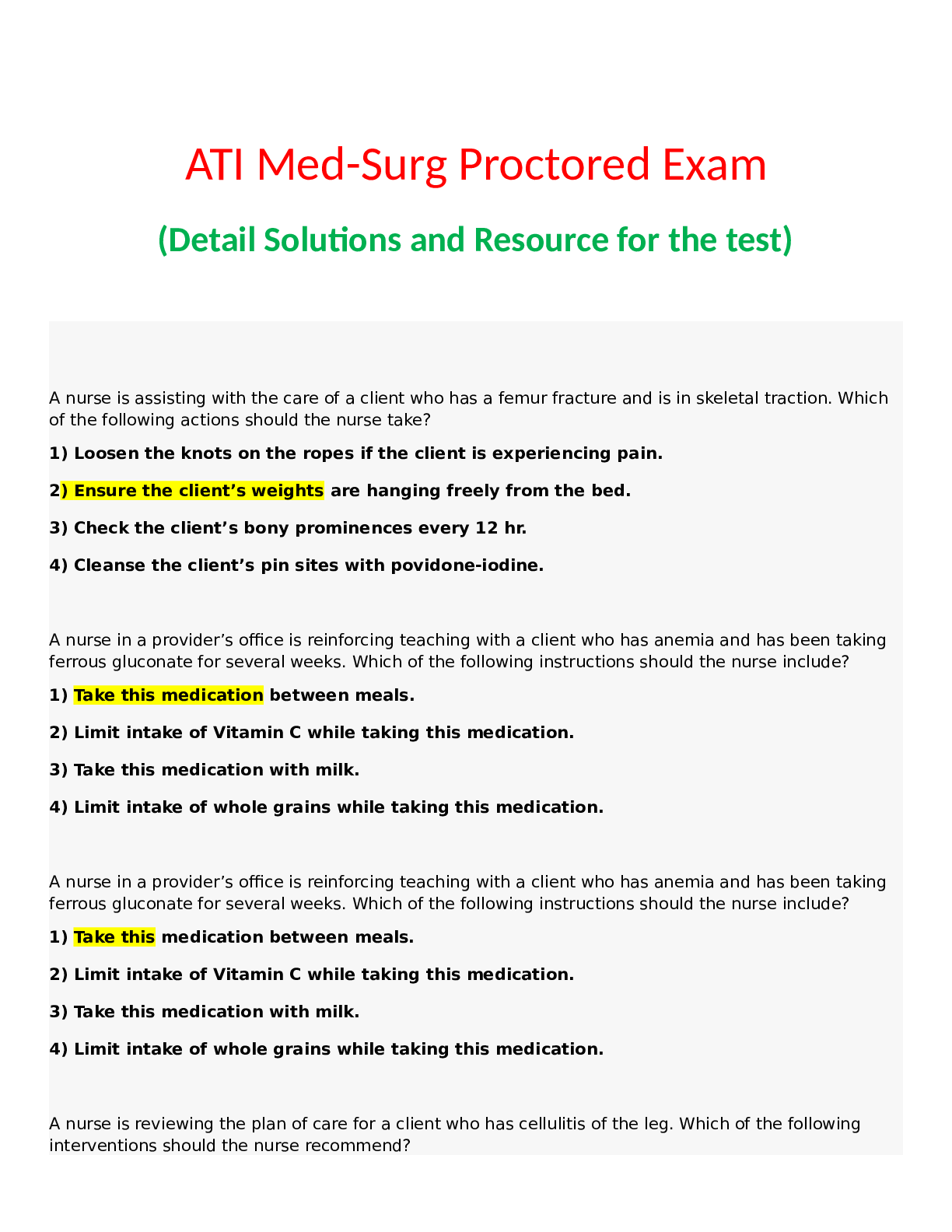
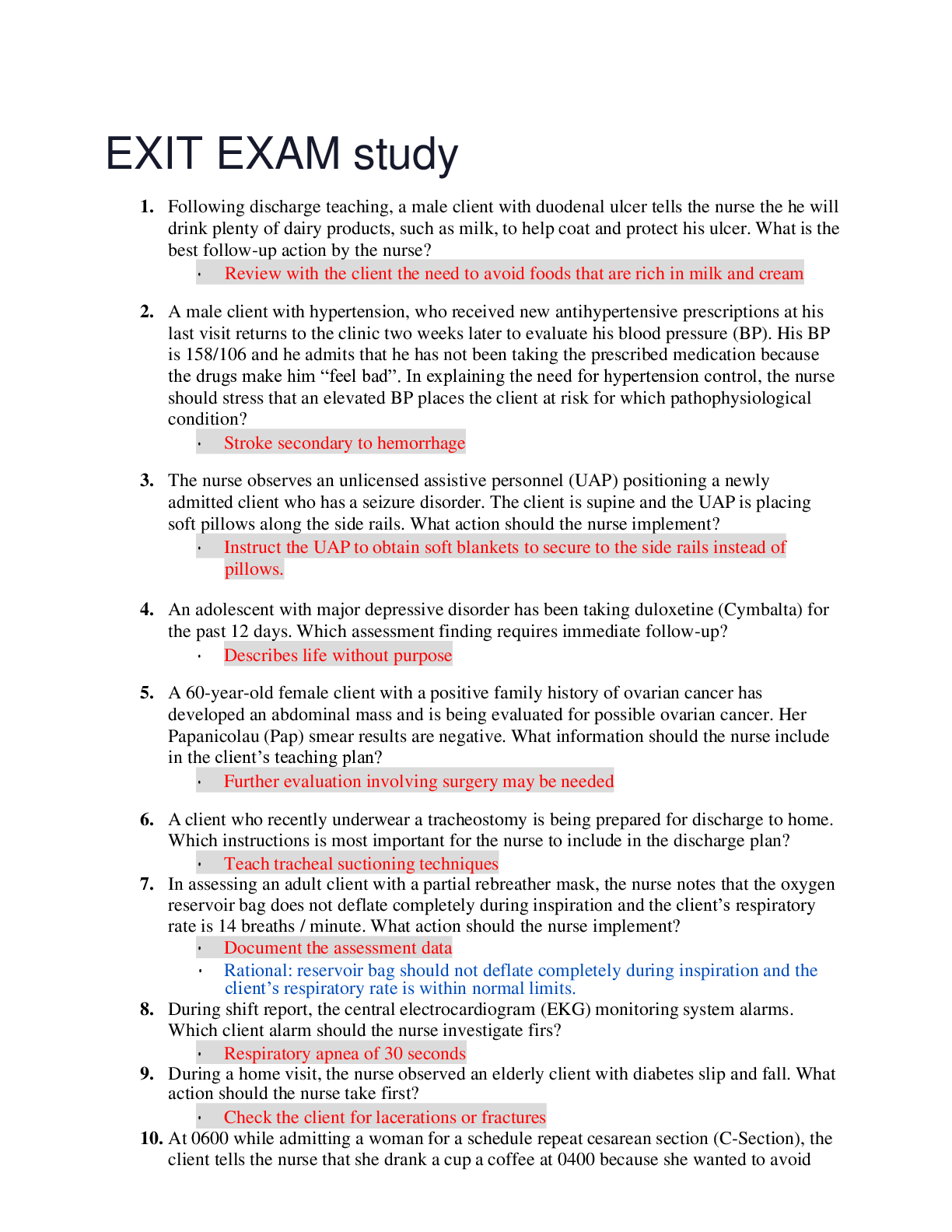
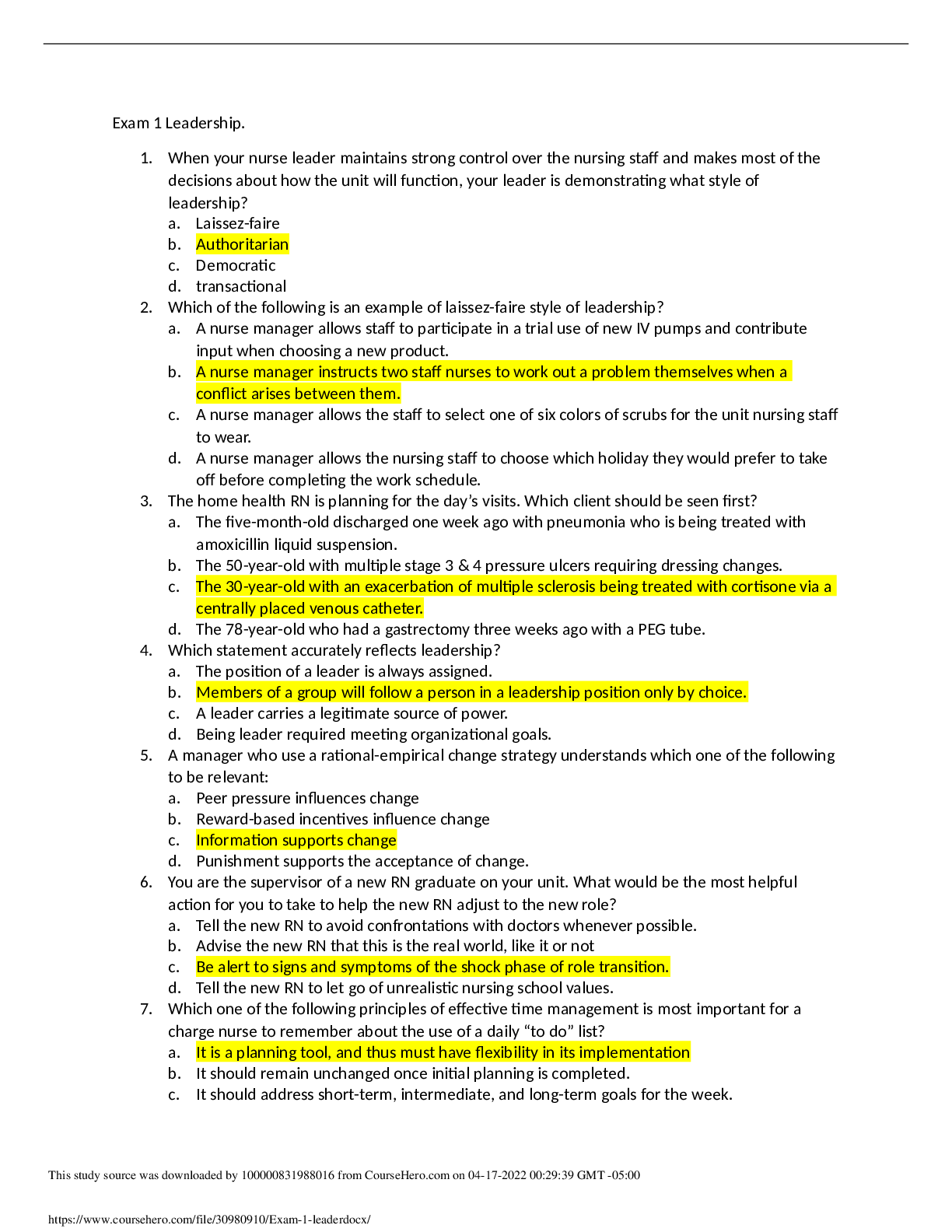
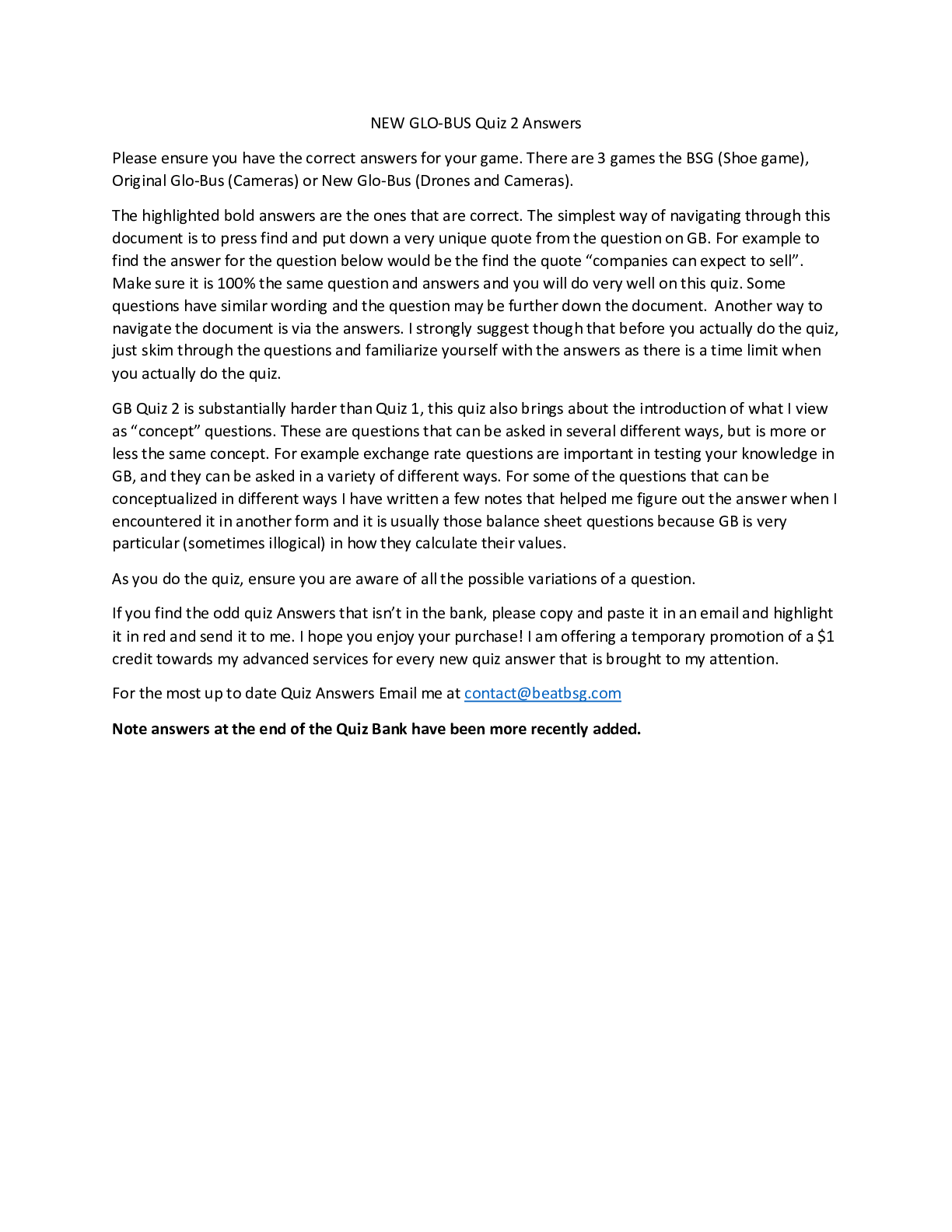
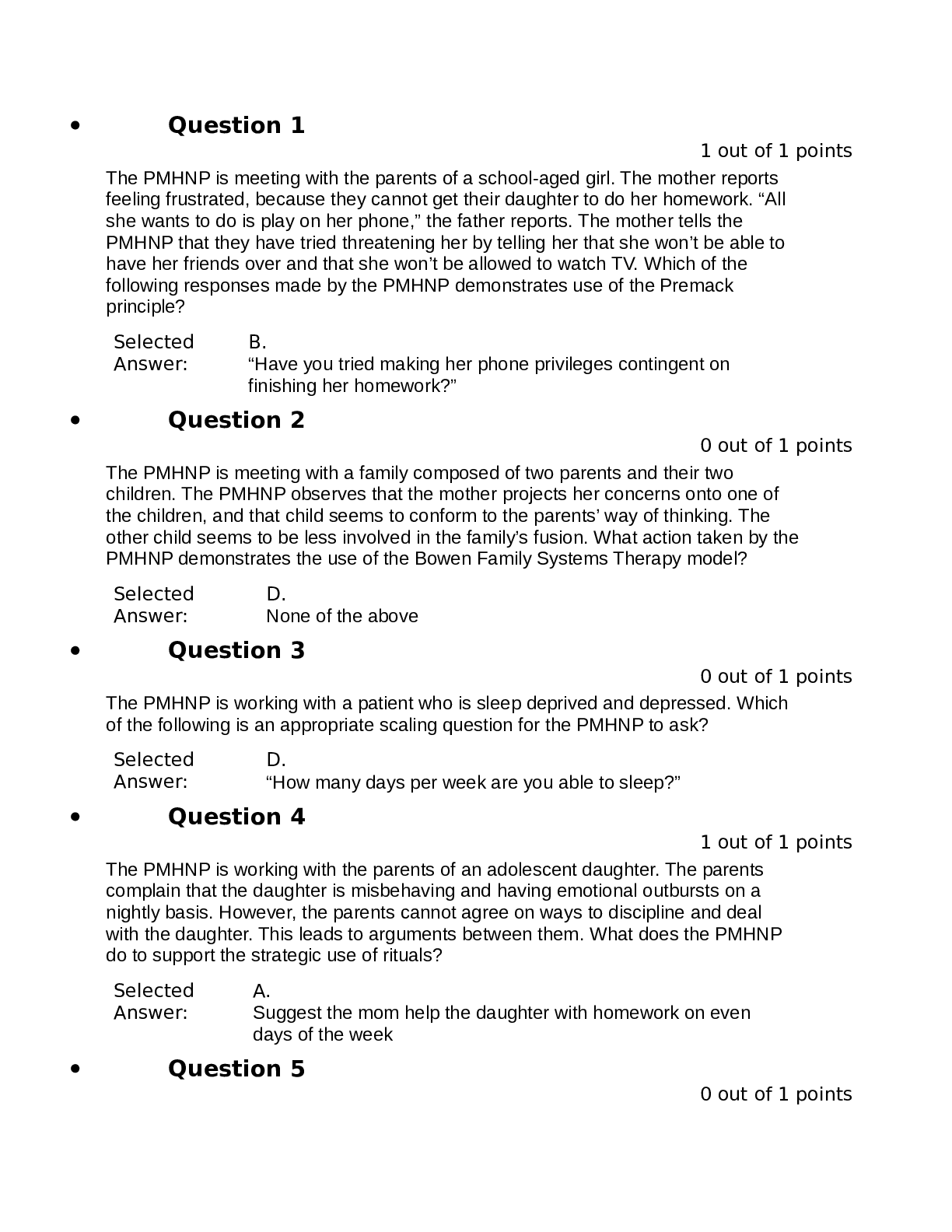
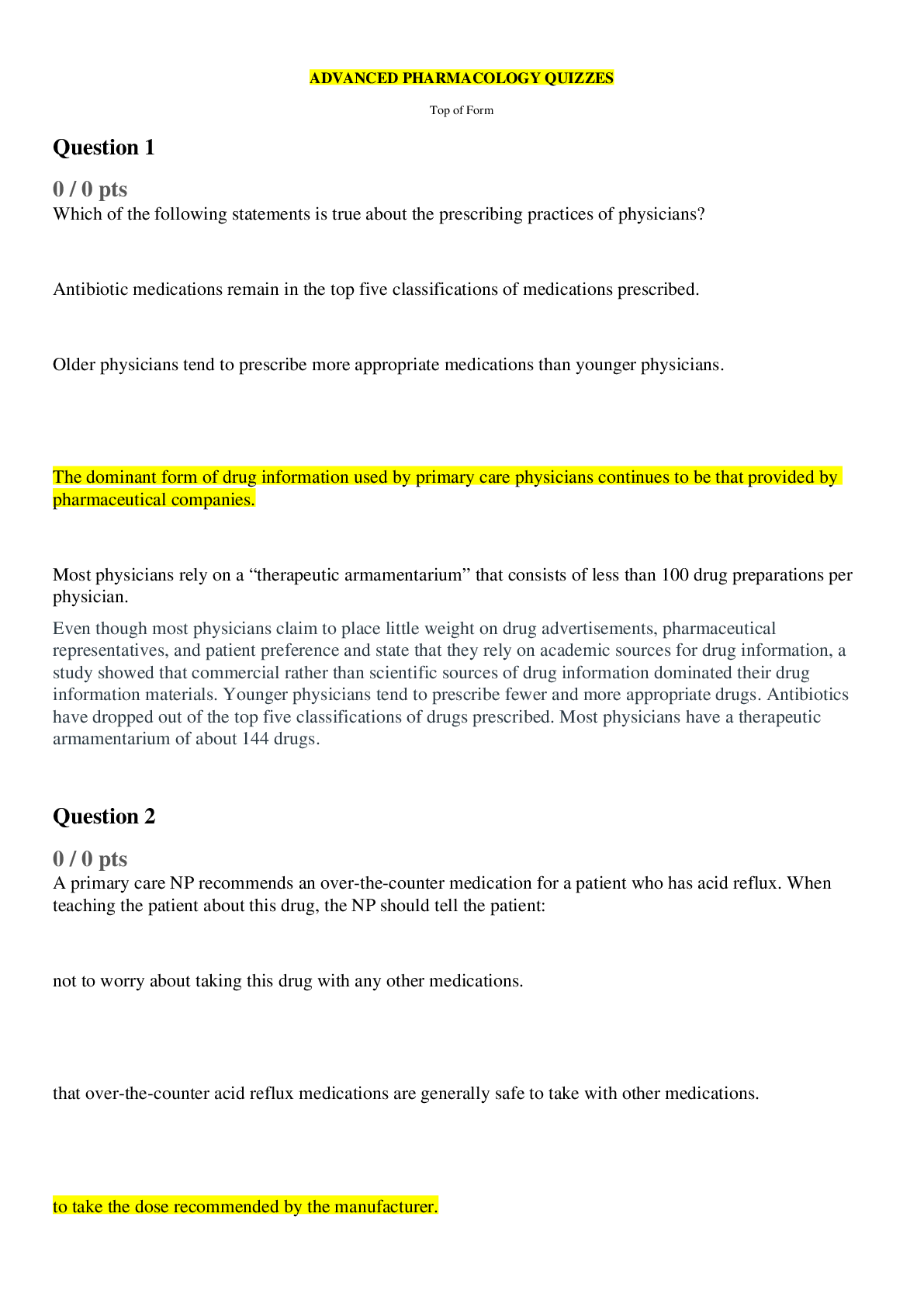
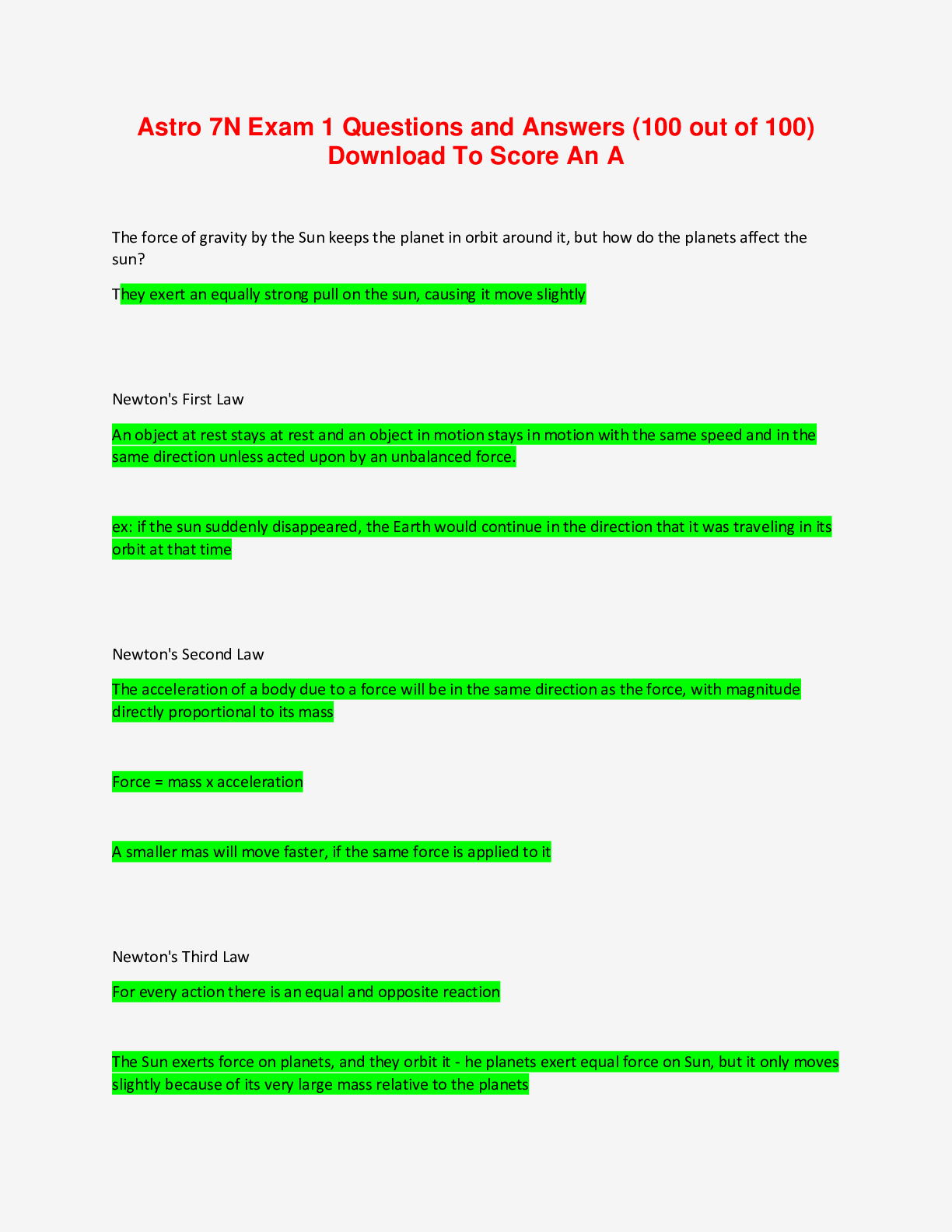
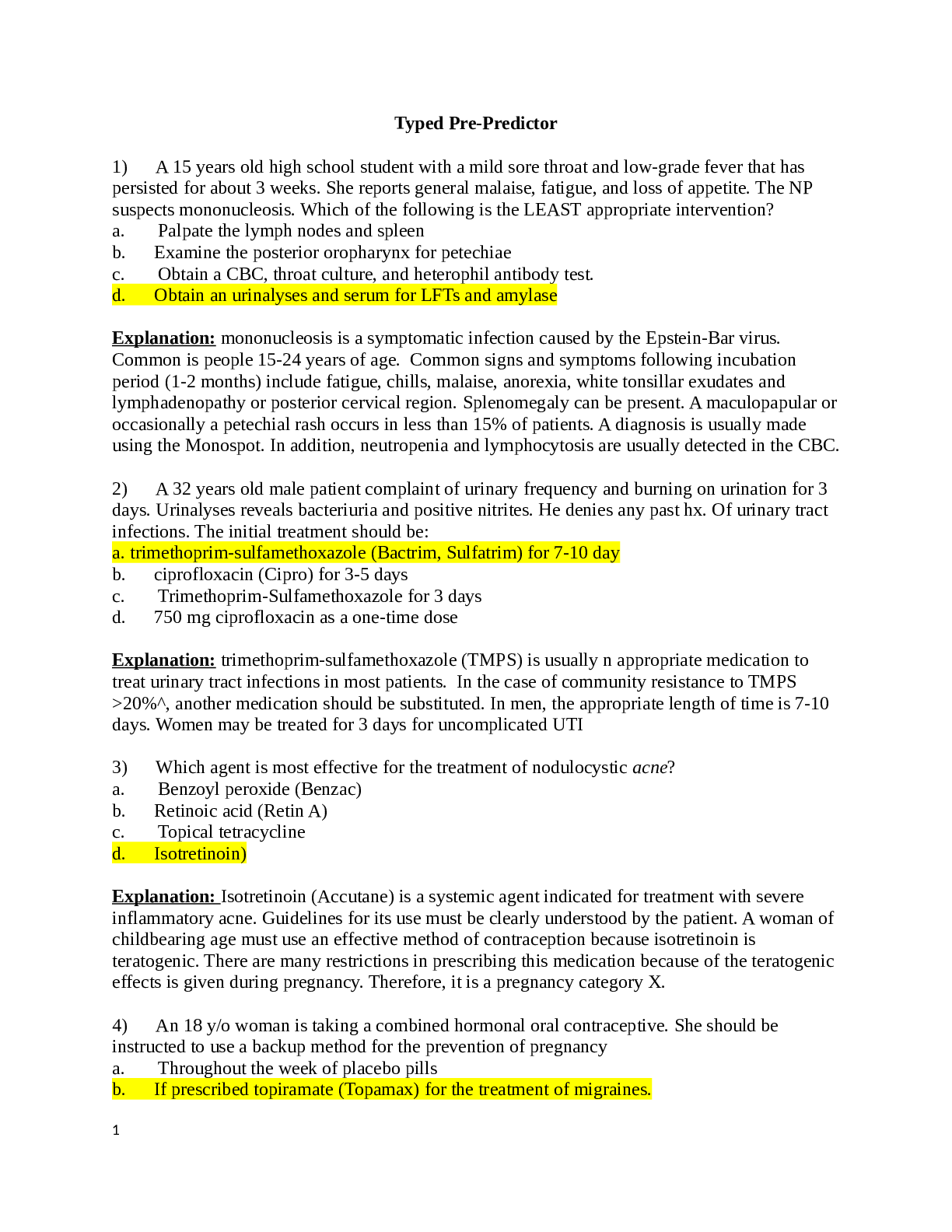
.png)
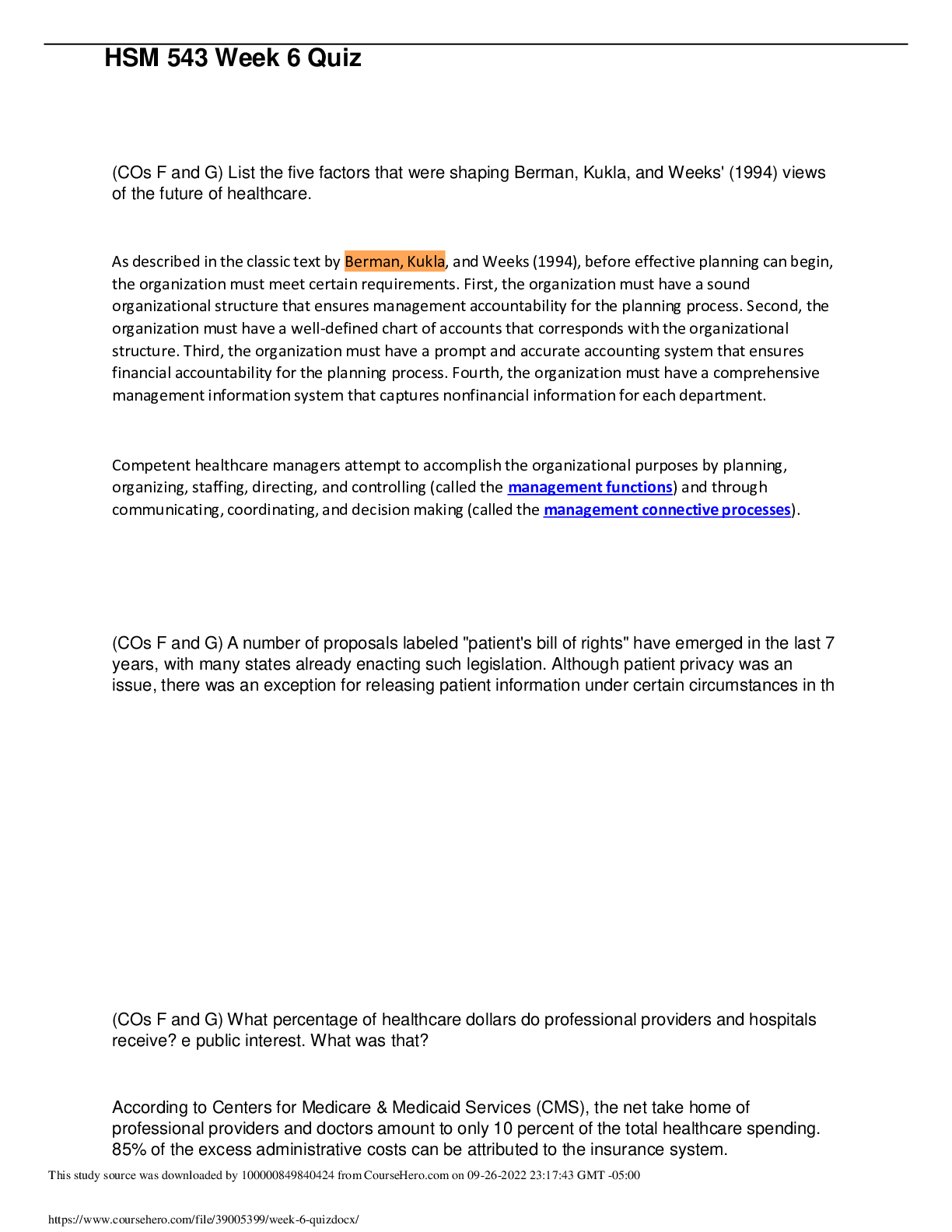
 (1).png)
